Spring 2020
Editor’s Note
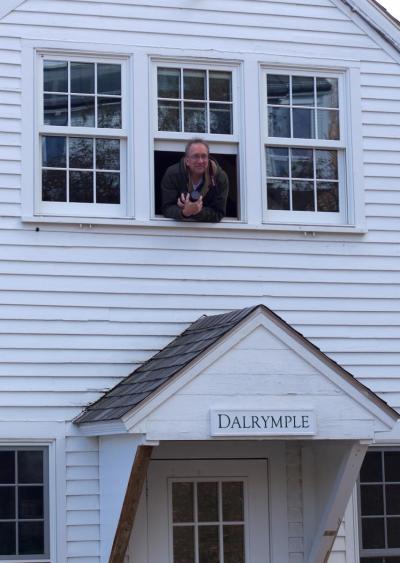 “Scientific careers, like life itself, are usually a work in progress,” says Charles Curtin ’86 in his feature on new perspectives on landscape-scale ecology and conservation in this issue of Potash Hill. “Like a series of experiments, one’s thinking evolves to reflect emerging realities.” There’s been a whole lot of emerging realities at this venerable institution of higher learning known, for now, as Marlboro College, and much of this issue contends with the college’s work in progress.
“Scientific careers, like life itself, are usually a work in progress,” says Charles Curtin ’86 in his feature on new perspectives on landscape-scale ecology and conservation in this issue of Potash Hill. “Like a series of experiments, one’s thinking evolves to reflect emerging realities.” There’s been a whole lot of emerging realities at this venerable institution of higher learning known, for now, as Marlboro College, and much of this issue contends with the college’s work in progress.
One would be excused for being suspicious. In the last issue of Potash Hill (Fall 2019), yours truly was singing the praises of a planned merger with University of Bridgeport, which had fallen through before the magazine even mailed. This time feels different. The proposed Marlboro Institute for Liberal Arts and Interdisciplinary Studies has been made possible by our alliance with a trusted and well-known partner, Emerson College. Although it means the loss of Potash Hill, a place central to Marlboro’s history and appeal, it also means the preservation of much that the college holds dear.
This issue of Potash Hill will give you a glimpse of how working groups are charting the best path forward for faculty, students, staff, and the campus itself, and how students are working to document the last semester on campus. It shares the many visits between members of the Marlboro and Emerson communities, and promotes the important work of the recently relaunched Alumni Association. And, of course, much more.
What will happen to Potash Hill, the magazine? It is our sincere hope to publish one more print issue in the fall, in which we can celebrate the last graduating class and generally ponder Marlboro’s legacy going forward. That is why this issue is being published online, primarily, to conserve resources and prepare for that final issue. What will happen after that, well, let’s just say it’s a work in progress!
How is your thinking evolving? What is Marlboro’s legacy? What kind of an impact did the college have on your life? As always, we love to hear from our readers at pjohansson@marlboro.edu.
—Philip Johansson, editor
Inside Front Cover
Potash Hill
Published twice every year, Potash Hill shares highlights of what Marlboro College community members, in both undergraduate and graduate programs, are doing, creating, and thinking. The publication is named after the hill in Marlboro, Vermont, where the college was founded in 1946. “Potash,” or potassium carbonate, was a locally important industry in the 18th and 19th centuries, obtained by leaching wood ash and evaporating the result in large iron pots. Students and faculty at Marlboro no longer make potash, but they are very industrious in their own way, as this publication amply demonstrates.
Editor: Philip Johansson
Alumni Director: Maia Segura ’91
Staff Photographers: Emily Weatherill ’21 and Clement Goodman ’22
Staff Writer: Sativa Leonard ’23
Design: Falyn Arakelian
Potash Hill welcomes letters to the editor. Mail them to: Editor, Potash Hill, Marlboro College, P.O. Box A, Marlboro, VT 05344, or send email to pjohansson@marlboro.edu. The editor reserves the right to edit for length letters that appear in Potash Hill.
Front Cover: The Serkin Center for the Performing Arts takes on an air of ambiguity as reflected in the campus fire pond. The future of the campus has been on the mind of many, as Marlboro College prepares to enter an alliance with Emerson College. Photo by Richard Smith
 Students in the Body as Material and Metaphor class (right) demonstrate teamwork during their performance of “InterCorporeum,” choreographed by visiting artist Daniel Bear Davis, in December’s Dances in the Rough showcase. Students have provided unprecedented mutual support in the past year, and have responded to the uncertain future with empathy and compassion. See some excerpts from Dances in the Rough. Photo by Emily Weatherill ‘21.
Students in the Body as Material and Metaphor class (right) demonstrate teamwork during their performance of “InterCorporeum,” choreographed by visiting artist Daniel Bear Davis, in December’s Dances in the Rough showcase. Students have provided unprecedented mutual support in the past year, and have responded to the uncertain future with empathy and compassion. See some excerpts from Dances in the Rough. Photo by Emily Weatherill ‘21.
About Marlboro College
Marlboro College provides independent thinkers with exceptional opportunities to broaden their intellectual horizons, benefit from a small and close-knit learning community, establish a strong foundation for personal and career fulfillment, and make a positive difference in the world. At our campus in the town of Marlboro, Vermont, students engage in deep exploration of their interests while developing transferrable skills that can be directly correlated with success after graduation, known as the Marlboro Promise. These skills are: (1) the ability to write with clarity and precision; (2) the ability to work, live, and communicate with a wide range of individuals; and (3) the ability to lead an ambitious project from idea to execution. Marlboro students fulfill this promise in an atmosphere that emphasizes critical and creative thinking, independence, an egalitarian spirit, and community.
Up Front
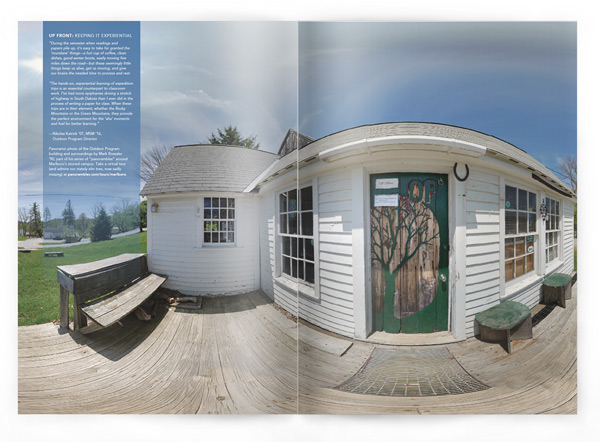
Keeping it Experiential
“During the semester when readings and papers pile up, it’s easy to take for granted the ‘mundane’ things—a hot cup of coffee, clean dishes, good winter boots, easily moving five miles down the road—but these seemingly little things keep us alive, get us moving, and give our brains the needed time to process and rest.
“The hands-on, experiential learning of expedition trips is an essential counterpart to classroom work. I’ve had more epiphanies driving a stretch of highway in South Dakota than I ever did in the process of writing a paper for class. When these trips are in their element, whether the Rocky Mountains or the Green Mountains, they provide the perfect environment for the ‘aha’ moments and fuel for better learning.”
— Nikolas Katrick ’07, MSM ’16, Outdoor Program Director
Panoramic photo of the Outdoor Program building and surroundings by Mark Roessler ’90, part of his series of “panorambles” around Marlboro’s storied campus. Take a virtual tour (and admire our stately elm tree, now sadly missing) at panorambles.com/tours/marlboro.
Clear Writing
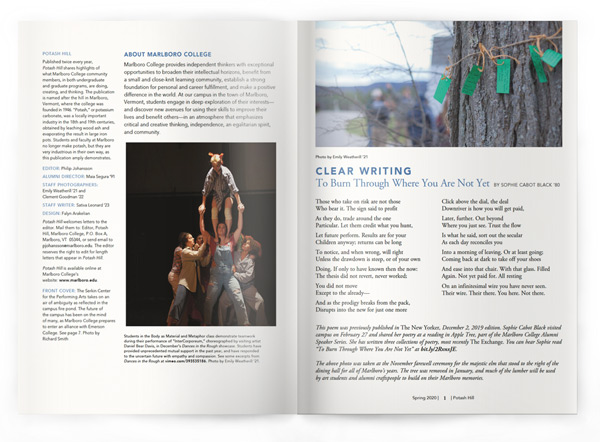
To Burn Through Where You Are Not Yet
By Sophie Cabot Black '80
Those who take on risk are not those
Who bear it. The sign said to profit
As they do, trade around the one
Particular. Let them credit what you hunt,
Let future perform. Results are for your
Children anyway; returns can be long
To notice, and when wrong, will right
Unless the drawdown is steep, or of your own
Doing. If only to have known then the now:
The thesis did not revert, never worked;
You did not move
Except to the already—
And as the prodigy breaks from the pack,
Disrupts into the new for just one more
Click above the dial, the deal
Downriver is how you will get paid,
Later, further. Out beyond
Where you just see. Trust the flow
Is what he said, sort out the secular
As each day reconciles you
Into a morning of leaving. Or at least going;
Coming back at dark to take off your shoes
And ease into that chair. With that glass. Filled
Again. Not yet paid for. All resting
On an infinitesimal wire you have never seen.
Their wire. Their there. You here. Not there.
This poem was previously published in The New Yorker, December 2, 2019 edition. Sophie Cabot Black visited campus on February 27 and shared her poetry at a reading in Apple Tree, part of the Marlboro College Alumni Speaker Series. She has written three collections of poetry, most recently The Exchange. You can hear Sophie read “To Burn Through Where You Are Not Yet.”
The above photo was taken at the November farewell ceremony for the majestic elm that stood to the right of the dining hall for all of Marlboro’s years. The tree was removed in January, and much of the lumber will be used by art students and alumni craftspeople to build on their Marlboro memories.
Letters
Remembering Hillary 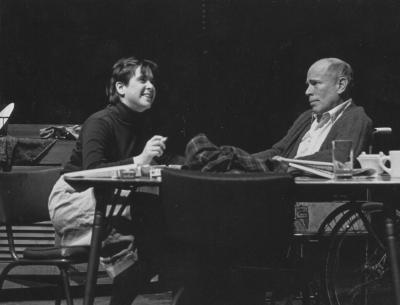 I sent a poem I wrote the day I found out Hilary Sloin had died (Potash Hill Fall 2019), but asked that it not be considered for Potash Hill because I expressed anger at her for dying, and because I used cuss words. And then I thought of the years she and I worked with T. Wilson in Poetry Workshop. Hil and I were so serious about writing then and, gratifyingly, T. took us seriously. It was the best writing training I’ve ever had—sitting in that sunny classroom, high up in an old barn, arguing about whether one word or another was extraneous.
I sent a poem I wrote the day I found out Hilary Sloin had died (Potash Hill Fall 2019), but asked that it not be considered for Potash Hill because I expressed anger at her for dying, and because I used cuss words. And then I thought of the years she and I worked with T. Wilson in Poetry Workshop. Hil and I were so serious about writing then and, gratifyingly, T. took us seriously. It was the best writing training I’ve ever had—sitting in that sunny classroom, high up in an old barn, arguing about whether one word or another was extraneous.
I think the poem would pass a workshop criticism. I think Hil would be ok with the F-bombs and the anger. We were estranged for years, but she was never far from my thoughts and a couple years ago I found her again. We were both working on old furniture and selling old stuff. Both single, living with our dogs and driving old pickup trucks. Our apples didn’t fall far.
In fact, we first met in the apple trees next to the dining hall. We climbed the apple trees and talked like third graders: what do you like, what’s cool. We never agreed on everything but we related to each other a lot. She was funny, she was sweet, she was opinionated, she wasn’t always right, she made me laugh. She was an amazingly hard-working and talented writer. I’m lucky I knew her.
—Rachel Mendez ’85
Sacred Singing
I’m a PhD student at the University of Illinois and am working on my dissertation about Sacred Harp singing in the northeast. I found a reference to an article in Potash Hill, Spring of 1981, by Anthony Barrand and Carole Moody, called “The Making of Northern Harmony.” I was wondering if it’s possible to acquire this article either through your office, the library, or elsewhere on campus. Thanks very much for any help you can offer.
—Jonathon Smith
Marlboro’s archivist fellow Megan O’Loughlin was able to locate this issue of Potash Hill in the library and sent a scan of “The Making of Northern Harmony” to Jonathon, which you can find here: marlboro.edu/harmony. —ed.
Last Potash Hill?
If things go well with Emerson College as planned, this Potash Hill stands to be the penultimate issue, with one more published in Fall 2020 to honor our last graduating class on campus, make some cumulative sense of Marlboro’s legacy, and prepare readers for what might come next. Readers are encouraged to contribute to this final issue, in the form of letters, memories, vignettes, poems, or pictures. What was your favorite class? Who was your biggest crush? What was your ultimate Marlboro experience? What did this land that we all hold dear mean to you? Please send your memories to pjohansson@marlboro.edu. We will publish as many submissions as space allows, and post the remainder online.
Errata
As an alumna who graduated last May, I was able to see firsthand some of the work that was done with CASP and the asylum seekers (Potash Hill Fall 2019). I noticed that one of the main participants in the committee, Rosario de Swanson, a professor who has gone above and beyond in her work for the college, was not mentioned in the article. I hope there will be some acknowledgement of this error and that it will be made right.
—Alicia Lowden ’19
Thanks, Alicia, for keeping us honest. Rosario’s name was added to the digital version of the Fall 2019 Potash Hill. Please accept our apologies. —ed.
Potash Hill regrets that we misspelled the name of departed staff member Karleen Crossman in her obituary. —ed.
View from the Hill
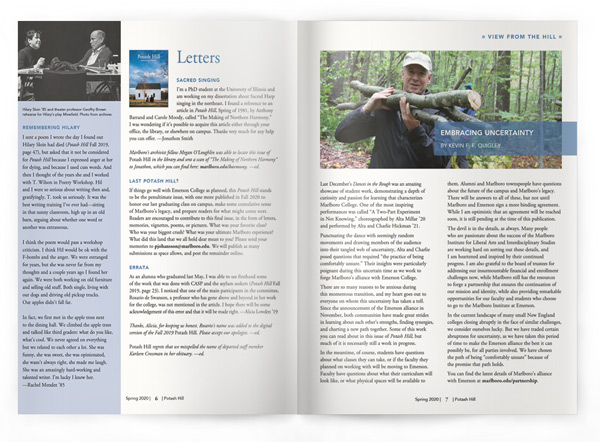
Embracing Uncertainty
By Kevin F. F. Quigley
Last December’s Dances in the Rough was an amazing showcase of student work, demonstrating a depth of curiosity and passion for learning that characterizes Marlboro College. One of the most inspiring performances was called “A Two-Part Experiment in Not Knowing,” choreographed by Alta Millar ’20 and performed by Alta and Charlie Hickman ’21.
Punctuating the dance with seemingly random movements and drawing members of the audience into their tangled web of uncertainty, Alta and Charlie posed questions that required “the practice of being comfortably unsure.” Their insights were particularly poignant during this uncertain time as we work to forge Marlboro’s alliance with Emerson College.
There are so many reasons to be anxious during this momentous transition, and my heart goes out to everyone on whom this uncertainty has taken a toll. Since the announcement of the Emerson alliance in November, both communities have made great strides in learning about each other’s strengths, finding synergies, and charting a new path together. Some of this work you can read about in this issue of Potash Hill, but much of it is necessarily still a work in progress.
In the meantime, of course, students have questions about what classes they can take, or if the faculty they planned on working with will be moving to Emerson. Faculty have questions about what their curriculum will look like, or what physical spaces will be available to them. Alumni and Marlboro townspeople have questions about the future of the campus and Marlboro’s legacy. There will be answers to all of these, but not until Marlboro and Emerson sign a more binding agreement. While I am optimistic that an agreement will be reached soon, it is still pending at the time of this publication.
The devil is in the details, as always. Many people who are passionate about the success of the Marlboro Institute for Liberal Arts and Interdisciplinary Studies are working hard on sorting out these details, and I am heartened and inspired by their continued progress. I am also grateful to the board of trustees for addressing our insurmountable financial and enrollment challenges now, while Marlboro still has the resources to forge a partnership that ensures the continuation of our mission and identity, while also providing remarkable opportunities for our faculty and students who choose to go to the Marlboro Institute at Emerson.
In the current landscape of many small New England colleges closing abruptly in the face of similar challenges, we consider ourselves lucky. But we have traded certain abruptness for uncertainty, as we have taken this period of time to make the Emerson alliance the best it can possibly be, for all parties involved. We have chosen the path of being “comfortably unsure” because of the promise that path holds.
You can find the latest details of Marlboro’s alliance with Emerson at marlboro.edu/partnership.
Sustaining Wide Open Spaces
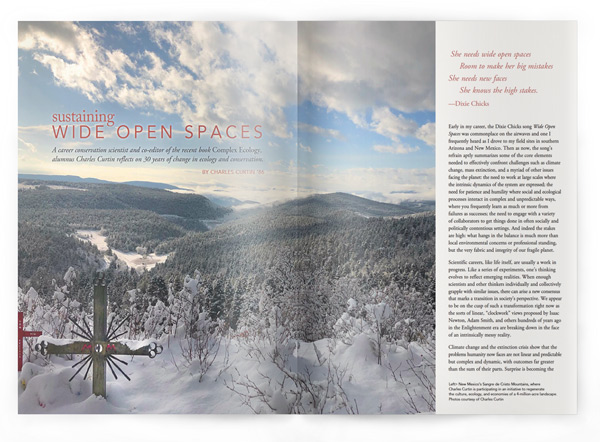
By Charles Curtin '86
A career conservation scientist and co-editor of the recent book Complex Ecology, alumnus Charles Curtin reflects on 30 years of change in ecology and conservation.
She needs wide open spaces Room to make her big mistakes She needs new faces She knows the high stakes. —Dixie Chicks
Early in my career, the Dixie Chicks song Wide Open Spaces was commonplace on the airwaves and one I frequently heard as I drove to my field sites in southern Arizona and New Mexico. Then as now, the song’s refrain aptly summarizes some of the core elements needed to effectively confront challenges such as climate change, mass extinction, and a myriad of other issues facing the planet: the need to work at large scales where the intrinsic dynamics of the system are expressed; the need for patience and humility where social and ecological processes interact in complex and unpredictable ways, where you frequently learn as much or more from failures as successes; the need to engage with a variety of collaborators to get things done in often socially and politically contentious settings. And indeed the stakes are high: what hangs in the balance is much more than local environmental concerns or professional standing, but the very fabric and integrity of our fragile planet.
Scientific careers, like life itself, are usually a work in progress. Like a series of experiments, one’s thinking evolves to reflect emerging realities. When enough scientists and other thinkers individually and collectively grapple with similar issues, there can arise a new consensus that marks a transition in society’s perspective. We appear to be on the cusp of such a transformation right now as the sorts of linear, “clockwork” views proposed by Isaac Newton, Adam Smith, and others hundreds of years ago in the Enlightenment era are breaking down in the face of an intrinsically messy reality.
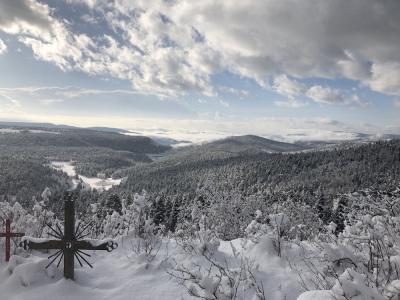 Climate change and the extinction crisis show that the problems humanity now faces are not linear and predictable but complex and dynamic, with outcomes far greater than the sum of their parts. Surprise is becoming thenew norm. Events such as Hurricane Katrina and the earthquake and tsunami at Fukushima highlight the need for a different kind of science and policy, one that addresses challenges with a new humility and pragmatism. My own journey of discovery parallels this important transition in scientific thinking.
Climate change and the extinction crisis show that the problems humanity now faces are not linear and predictable but complex and dynamic, with outcomes far greater than the sum of their parts. Surprise is becoming thenew norm. Events such as Hurricane Katrina and the earthquake and tsunami at Fukushima highlight the need for a different kind of science and policy, one that addresses challenges with a new humility and pragmatism. My own journey of discovery parallels this important transition in scientific thinking.
The first phase of my evolving thinking on science and complexity began with my time at Marlboro College, where my professors (especially Bob Engel) introduced me to the view that quality science was both rigorous and elegant. Classic ecological studies, such as those of luminary ecologist and Marlboro alumnus Robert MacArthur (brother of Marlboro physics professor John), transformed ecology from primarily a descriptive to a quantitative discipline. But equally important, the MacArthur brothers and collaborators showed experimental ecology to be something of immense beauty.
In paraphrasing Pablo Picasso, Robert once stated, “Science is the lie that helps us see the truth,” recognizing that science, like art, is as much about insight as a search for objective reality. Especially in the post-war era from the 1950s through the early 1980s, the relatively simple math available to ecologists before computational power became widespread meant that much of the science of the period was a gross simplification of reality. But this simplification led to an elegance and focus on big conceptual questions that have rarely been attempted since.
Following Marlboro, my graduate career was also marked by a search for conceptual elegance. From research on the recovery of subalpine ecosystems in Colorado to studies on the impact of climate and land-use change on species, my approach embraced a search for simple solutions to complex challenges. This was followed by a post-doc at the University of New Mexico with ecologist James H. Brown, managing studies of desert ecological communities (work I had read and admired as an undergraduate at Marlboro).
Brown’s work was another series of exceedingly elegant experiments that provided clarity through simplifications of reality. However, during my post-doc, I also had the opportunity to spend time at a complex-system think tank, the Santa Fe Institute (SFI). My time at SFI would forever change the way I viewed science and conservation, by recognizing that elegance did not necessarily require a focus on simplification. Instead, a fundamental challenge of science and conservation was to embrace reality by grappling with complexity.
Out of my interest in demonstrating that experimental ecology could incorporate complexity arose the McKinney Flats Project, a nearly 9,000-acre experiment in southern New Mexico. This project was a microcosm of study plots spanning a million-acre conservation planning area, and was intended to provide insight into the dynamics playing out across the entire intermountain West. However, it soon became apparent that to understand systems at the size of even 9,000 acres would take at least 12 to 16 years. This period was far too long to acquire the requisite publications to attain tenure at most universities. So a new sort of science was needed, one embedded in vast landscapes and that involved working closely with remote rural communities.
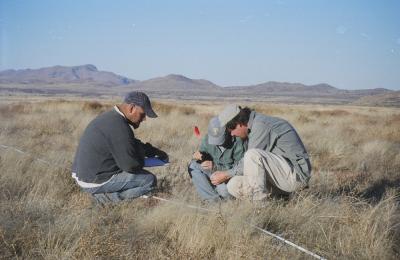 I left academia and founded a nonprofit research institute that provided the institutional flexibility and ability to produce the answers I thought society most needed. As it turned out, McKinney Flats was as much a social experiment as a biological one. I was simultaneously having cowboys manage a 200-head herd of cattle, undertaking 8,000-acre prescribed burns, introducing species such as prairie dogs, and working with biologists on a diversity of ecological sampling. Doing all this while also sustaining a partnership with the rancher-led conservation organization Malpai Borderlands Group proved to be both challenging and insightful. No longer was I applying comparatively simple, replicated experimental designs, but working amid the intrinsic messiness of the “real world,” where social dynamics are just as important as ecological ones.
I left academia and founded a nonprofit research institute that provided the institutional flexibility and ability to produce the answers I thought society most needed. As it turned out, McKinney Flats was as much a social experiment as a biological one. I was simultaneously having cowboys manage a 200-head herd of cattle, undertaking 8,000-acre prescribed burns, introducing species such as prairie dogs, and working with biologists on a diversity of ecological sampling. Doing all this while also sustaining a partnership with the rancher-led conservation organization Malpai Borderlands Group proved to be both challenging and insightful. No longer was I applying comparatively simple, replicated experimental designs, but working amid the intrinsic messiness of the “real world,” where social dynamics are just as important as ecological ones.
Although the McKinney Flats study ended prematurely, due to the 2007–2008 recession and concurrent social upheaval along the US-Mexico border, valuable lessons had been learned. I found that effective science and conservation are a result of social design as much as scientific replication—putting in place the preconditions for success that most biological scientists and conservationists rarely consider. I recognized that there needed to be a greater synthesis of social and ecological approaches.
My experience gave me a new perspective now widely accepted, but still seldom attained, where one does not think along purely disciplinary boundaries but views disciplines as different tools in a diverse tool kit. The role of the researcher is to select the right tool for the job, rather than merely applying a paradigm because it is what you know. Theories were no longer suppositions to be defended, but ideas to be explored and thoughtfully challenged. Complexity is embraced, rather than avoided— the intrinsic messiness of the world is designed into the study, rather than designed out of it.
In tandem with McKinney Flats, and in the years that followed, I embarked on a wide range of social and ecological experiments related to collaborative science and conservation. This work engaged a wide array of stakeholders in large-scale problem solving with a focus on involving local people and their values and insights in science and policy. These efforts included fishery recovery in the western Atlantic, collaborative conservation programs in East Africa and the Middle East, and farmer cooperatives in the Midwest and New England. I also co-founded programs on collaboration, complexity, and adaptive management at MIT and other universities.
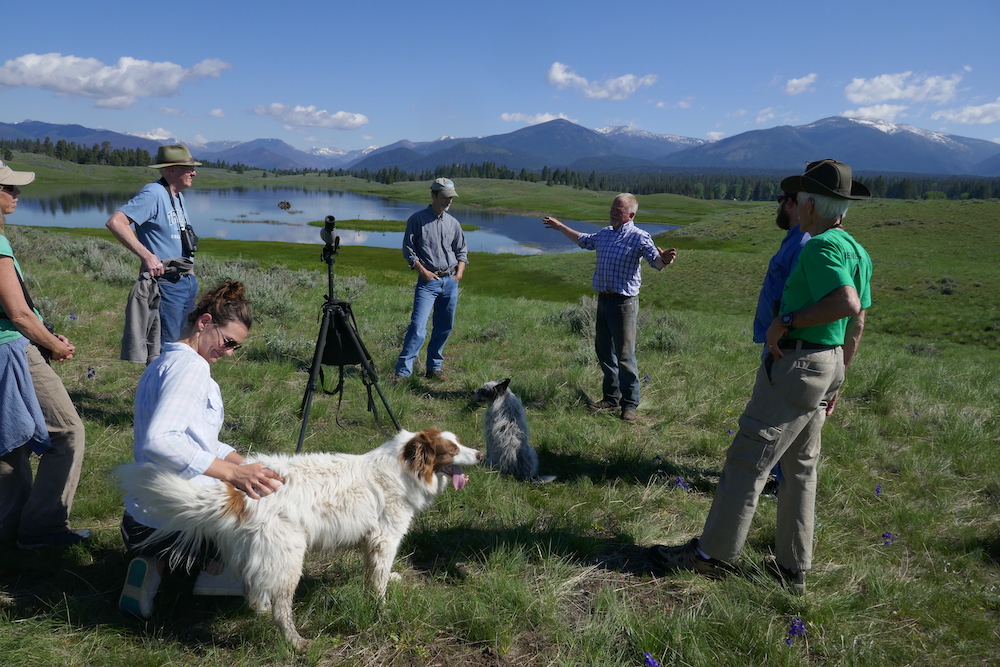 These experiences were followed by a return to on-the-ground efforts in collaborative conservation in Montana, where what I learned was sobering. It soon became apparent the ideas gleaned from my earlier efforts in large-scale science and conservation were necessary, but not sufficient to keep pace with the increasing rates of environmental and societal change. To mix metaphors, the best of conventional conservation was still mainly a process of rearranging deck chairs (while Rome burns). Yes, we were restoring watersheds and saving a few wolves or grizzly bears. However, we were not fundamentally addressing the most severe threats such as global environmental change, or wholesale transformations of local or indigenous cultures. This was because we were not meaningfully addressing the limitations undermining most science and policy. A fundamental rethink of conservation was needed.
These experiences were followed by a return to on-the-ground efforts in collaborative conservation in Montana, where what I learned was sobering. It soon became apparent the ideas gleaned from my earlier efforts in large-scale science and conservation were necessary, but not sufficient to keep pace with the increasing rates of environmental and societal change. To mix metaphors, the best of conventional conservation was still mainly a process of rearranging deck chairs (while Rome burns). Yes, we were restoring watersheds and saving a few wolves or grizzly bears. However, we were not fundamentally addressing the most severe threats such as global environmental change, or wholesale transformations of local or indigenous cultures. This was because we were not meaningfully addressing the limitations undermining most science and policy. A fundamental rethink of conservation was needed.
As the social philosopher Tom Atlee noted, “Things are getting better and better and worse and worse, faster and faster, simultaneously,” and current institutions are typically poorly situated to address this reality. Conservation actions too frequently represent halfway measures—in essence, the settling for less damaging outcomes, rather than fundamentally better solutions. In my career, I have to admit, I have too often been complacent in accepting such “solutions.” There were marine policies that mayhave reduced the decline of fisheries but didn’t address the core issue of unsustainable fishing practices, and collaborative organizations that protected endangered species but didn’t address agricultural practices that degrade watersheds and increase greenhouse gases.
Conventional collaborative approaches were essential in building common ground and an understanding of how to conduct conservation at large scales. It is certainly not appropriate to cast aside such testbeds of innovation and problem solving, for they have made enormous contributions to preserving communities and species. However, we need to learn and apply the lessons from decades of experience that have much to teach us about how to design, develop, and sustain more integrated efforts that consider the whole system and not just fragments. In short, we need to move beyond reactive to proactive approaches and policies.
The disappointments of Rio, Paris, and other climate accords, and the relative impermanence of global and national climate policy, strongly suggest that if effective action is to happen, it is not going to come from global agreements but from local engagement and action. It has to be built from the ground up, and right now we’re trying such an approach in the Sangre de Cristo mountains.
The Sangre de Cristo Initiative is seeking to regenerate the culture, ecology, and economies of a 4-million-acre landscape from north-central New Mexico to south-central Colorado. The point of this initiative is to show that conservation is not only sustainable, but can contribute to the integrity of social and ecological systems. Especially in some of the poorest counties in the US, we need to do more than protect nature. We need integrated solutions to the coupled challenges of rising global temperatures and the conservation of species and ecosystems, while engaging disenfranchised rural populations. We’re exploring using biomass energy production technologies to restore forest and watershed health, and fuel economic revitalization of the region while reducing CO2 inputs into the atmosphere.
There are many ways we can rethink conservation and science, but we must recognize that the status quo is often not sufficient, or perhaps even ethical, given the extent of current threats. Projects such as the Sangre de Cristo Initiative illustrate there are alternative frameworks that can make conservation and environmental science more effective in their service to society and the planet. These approaches bring together decades of experience searching for elegance and integrity, incorporating multiple viewpoints, and working across disciplines and ecological boundaries. They require humility to work with what Buddhist teachings call shoshin, or a “beginner’s mind,” where you address complex challenges with eagerness, openness, and a lack of preconceptions. Lastly, these new approaches to conservation include viewing actions as experiments, so one can truly learn from them.
“For a scientist there are worse sins than being wrong; one of them is being trivial.” —Robert H. MacArthur
Charles Curtin is a landscape ecologist and systems design theorist and practitioner who works at the intersection of science and policy, and is founder of BioCultural Connections in New Mexico. He is the author of The Science of Open Spaces: Theory and Practice for Conserving Large, Complex Systems and co-editor of Complex Ecology: Foundational Perspectives on Dynamic Approaches to Ecology and Conservation. His forthcoming book with the working title Prosilience: The Science of Complexity and Integrity is due out next year.
Ecology of the Individual 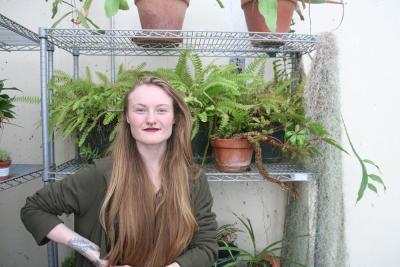 “Plants are often regarded as no more than resource objects— unfeeling, passive sorts of beings,” says Hailey Mount ’19, who completed her Plan in ecology and environmental philosophy in December. “But new science, technology, and attention to sustainable environmental relationships are allowing us to view the plant world with a new level of detail.” Hailey used a trait-based method of ecology—specifically, looking at the level of individual variation and scaling up and down between other levels from there—to look at how soil acidification could affect tree dynamics in Marlboro’s ecological reserve (Spring 2018 Potash Hill). “I’m exploring how these new techniques in ecology, and the philosophical idea of plants as subjective ‘others’ worthy of empathetic consideration, can come together and improve our environmental relationships, our management practices, and the way we interact with the world.”
“Plants are often regarded as no more than resource objects— unfeeling, passive sorts of beings,” says Hailey Mount ’19, who completed her Plan in ecology and environmental philosophy in December. “But new science, technology, and attention to sustainable environmental relationships are allowing us to view the plant world with a new level of detail.” Hailey used a trait-based method of ecology—specifically, looking at the level of individual variation and scaling up and down between other levels from there—to look at how soil acidification could affect tree dynamics in Marlboro’s ecological reserve (Spring 2018 Potash Hill). “I’m exploring how these new techniques in ecology, and the philosophical idea of plants as subjective ‘others’ worthy of empathetic consideration, can come together and improve our environmental relationships, our management practices, and the way we interact with the world.”
The Powers of Sound
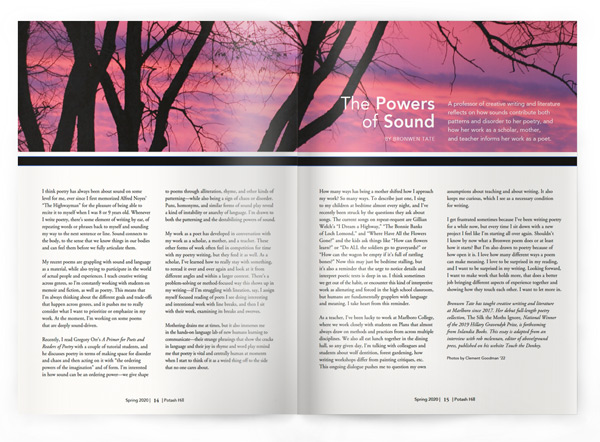
By Bronwen Tate
A professor of creative writing and literature reflects on how sounds contribute both patterns and disorder to her poetry, and how her work as a scholar, mother, and teacher informs her work as a poet.
I think poetry has always been about sound on some level for me, ever since I first memorized Alfred Noyes’ “The Highwayman” for the pleasure of being able to recite it to myself when I was 8 or 9 years old. Whenever I write poetry, there’s some element of writing by ear, of repeating words or phrases back to myself and sounding my way to the next sentence or line. Sound connects to the body, to the sense that we know things in our bodies and can feel them before we fully articulate them.
My recent poems are grappling with sound and language as a material, while also trying to participate in the world of actual people and experiences. I teach creative writing across genres, so I’m constantly working with students on memoir and fiction, as well as poetry. This means that I’m always thinking about the different goals and trade-offs that happen across genres, and it pushes me to really consider what I want to prioritize or emphasize in my work. At the moment, I’m working on some poems that are deeply sound-driven.
Recently, I read Gregory Orr’s A Primer for Poets and Readers of Poetry with a couple of tutorial students, and he discusses poetry in terms of making space for disorder and chaos and then acting on it with “the ordering powers of the imagination” and of form. I’m interested in how sound can be an ordering power—we give shape to poems through alliteration, rhyme, and other kinds of patterning—while also being a sign of chaos or disorder. Puns, homonyms, and similar forms of sound play reveal a kind of instability or anarchy of language. I’m drawn to both the patterning and the destabilizing powers of sound.
My work as a poet has developed in conversation with my work as a scholar, a mother, and a teacher. These other forms of work often feel in competition for time with my poetry writing, but they feed it as well. As a scholar, I’ve learned how to really stay with something, to reread it over and over again and look at it from different angles and within a larger context. There’s a problem-solving or method-focused way this shows up in my writing—if I’m struggling with lineation, say, I assign myself focused reading of poets I see doing interesting and intentional work with line breaks, and then I sit with their work, examining its breaks and swerves.
Mothering drains me at times, but it also immerses me in the hands-on language lab of new humans learning to communicate—their strange phrasings that show the cracks in language and their joy in rhyme and word play remind me that poetry is vital and centrally human at moments when I start to think of it as a weird thing off to the side that no one cares about.
How many ways has being a mother shifted how I approach my work? So many ways. To describe just one, I sing to my children at bedtime almost every night, and I’ve recently been struck by the questions they ask about songs. The current songs on repeat-request are Gillian Welch’s “I Dream a Highway,” “The Bonnie Banks of Loch Lomond,” and “Where Have All the Flowers Gone?” and the kids ask things like “How can flowers learn?” or “Do ALL the soldiers go to graveyards?” or “How can the wagon be empty if it’s full of rattling bones?” Now this may just be bedtime stalling, but it’s also a reminder that the urge to notice details and interpret poetic texts is deep in us. I think sometimes we get out of the habit, or encounter this kind of interpretive work as alienating and forced in the high school classroom, but humans are fundamentally grapplers with language and meaning. I take heart from this reminder.
As a teacher, I’ve been lucky to work at Marlboro College, where we work closely with students on Plans that almost always draw on methods and practices from across multiple disciplines. We also all eat lunch together in the dining hall, so any given day, I’m talking with colleagues and students about wolf dentition, forest gardening, how writing workshops differ from painting critiques, etc. This ongoing dialogue pushes me to question my own assumptions about teaching and about writing. It also keeps me curious, which I see as a necessary condition for writing.
I get frustrated sometimes because I’ve been writing poetry for a while now, but every time I sit down with a new project I feel like I’m starting all over again. Shouldn’t I know by now what a Bronwen poem does or at least how it starts? But I’m also drawn to poetry because of how open it is. I love how many different ways a poem can make meaning. I love to be surprised in my reading, and I want to be surprised in my writing. Looking forward, I want to make work that holds more, that does a better job bringing different aspects of experience together and showing how they touch each other. I want to let more in.
Bronwen Tate has taught creative writing and literature at Marlboro since 2017. Her debut full-length poetry collection, The Silk the Moths Ignore, National Winner of the 2019 Hillary Gravendyk Prize, is forthcoming from Inlandia Books. This essay is adapted from an interview with rob mclennan, editor of above/ground press, published on his website Touch the Donkey. Photos by Clement Goodman ’22
Poetry by Bronwen Tate
Reproductions of Frescoes
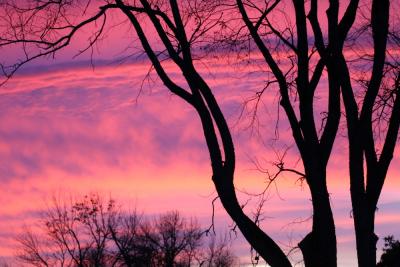 Travel back. Because of a misstep, I saw a crevice in a horse’s
Travel back. Because of a misstep, I saw a crevice in a horse’s
knee in place of brigands. Play of light and color off their helms.
Reading in the original French. Reading to be elsewhere. I look
past it, first conception.
I read Proust. In wide-sleeved houppelande, she incarnates.
Swollen fruit of her manly form a solid allusion. Prod that
membrane edged with ribbons of watercress or cuckoo flower.
For each word, a word in another language means part of the
same thing. When I look up “midwife” on the university website,
the only reference is to Plato. Theaetetus, he suggests, is in discomfort
because he is in intellectual labour.
I want to be a scholar. I want a new vernacular of milk.
Echo, echo, on my perch with my library. Well-stocked dictionary
sends me Latin, lygeum spartum, cultivated or not present here.
I Could Not Ask Other Flowers
Today multiplied.
A layered wealth of strata along the sloped face of the work. Ankle
bone, wind-blown grain, suck of honeysuckle, cell of honeycomb.
Approach the hedgerow with reverence due a rood loft (consent,
oh Lord, to bless). Spade in hand, cleave what knotted. I am
of the same stripe as she who cries into the thorned canopy. I
follow her gaze to the engraved steeple, bricked with birds’ nests.
Talus, alveolus, speak the landscape of a body. Thoughts pile
up, bent, twined, twisted as flowers.
Circumstances Legible Behind This Window
What is raw in me again, burst blister, lamb’s lettuce.
Fixed to hang on syllables, frivolous and drowsing. All modifiers
are contagious. Complacent. Glowing. All modifiers slip me in
the direction of the sea.
Without the residue of fixed habits, I loosen my gauge to make
sweet the absences. Lace is made of holes. Like a bassinet on a
lower step, my hum rocks side to side. Water diminishes in the
basin as the days grow drier. I say guard and mean keep.
To Hold What's Tender
Baby bathes
My lip bruised
from his hard crown
Lean down
his palm along my cheek
repeating “gentle”
hurts a little
Bruised Peaches
We measure days in peaches, bruises, livid, lose the keys
Find them days later in the dirty laundry. What is habit
That it wakes me up to effort? I cook but don’t dust, read
In bed, wash the sheets occasionally. Eat the peaches
Before they mold, wear wool socks against a cold July.
My signature slants “O” to a recognizable angle—what is
Unnoticed is unchanging; the B negative of my blood, unchecked,
Will reject babies that could have poisoned me in another age.
Might effort tilt the ratios of my articles, definite stamp of
All I’ve heard and hardened indefinite in what I make. A child is
Variable flung from the cells, being, substance-sewn
Self. In coming hours, a turn, determined angle, harkening,
Effortless. Biology wakes me to that cry. Subterranean
Singing through the fabric, thin-spread-thing, I am still here.
Umbilical
Blue umbilical pulse to cut, my last placenta
Stuck, the doctor scrubbed elbow-deep, that flesh
Suddenly neither of us, excess, would rot inside me.
I held him, purple still and scrawny, bawling.
Hot blankets, shivering, sweat-wracked, hormone high—
What is in the body, yours, mind, all mouth? We are
Our parts, not a self apart, grow new ancillaries, collaborate
On blood. My son nears three now, swipes and taps
Glass-faced watch-hands, asks if the umbilicus plugs
Into the wall, charged up on Coca-Cola, wails, “hard peaches
Are my favorite.” He wants what’s unripe. I slice and macerate
With sweet and salt and mint, tired now beyond cheek’s fuzz
And bloom. New one, I made you a room inside my mind.
Still you’ll split my skin to quit me.
“Reproduction of Frescos,” “I Could Not Ask Other Flowers,” and “Circumstances Legible Behind This Window,” were previously published in Touch the Donkey, #21.
The Inadequacy of Words
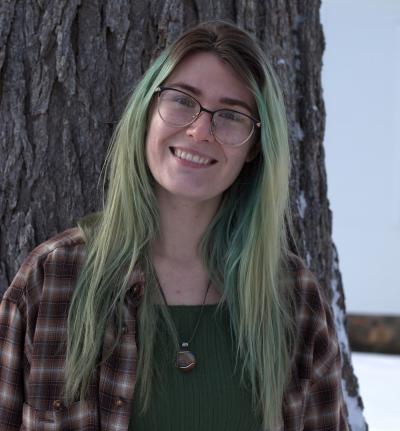 “Memory, like a good poem, can be returned to again and again, yielding new meanings from new angles,” says Brooke Evans ’19, who completed their Plan in writing in December. “When we write, we hold each memory in our hands, turn it, see past and present overlap.” The main component of Brooke’s Plan blends poetry and prose in a nonlinear, braided life-writing piece titled “As I Left It,” where prose rooted in childhood memories weaves into poetic forms that seek to collect and connect fragments. Their original works are supported by an essay reflecting on C.D. Wright’s idiosyncratic style and influence on their own experimental explorations. “What drew me to experiment with form and outside of conventional forms in my poetry and prose was the inadequacy of words alone to convey what I aim to express.”
“Memory, like a good poem, can be returned to again and again, yielding new meanings from new angles,” says Brooke Evans ’19, who completed their Plan in writing in December. “When we write, we hold each memory in our hands, turn it, see past and present overlap.” The main component of Brooke’s Plan blends poetry and prose in a nonlinear, braided life-writing piece titled “As I Left It,” where prose rooted in childhood memories weaves into poetic forms that seek to collect and connect fragments. Their original works are supported by an essay reflecting on C.D. Wright’s idiosyncratic style and influence on their own experimental explorations. “What drew me to experiment with form and outside of conventional forms in my poetry and prose was the inadequacy of words alone to convey what I aim to express.”
Perspective
Silencing the Most Vulnerable
By Nick Creel
In June 2018, five journalists working at the Capital in Annapolis, Maryland, were violently gunned down, and two others were injured. Only 48 hours before, far-right journalist Milo Yiannopoulos remarked to reporters that he “[couldn’t] wait for the vigilante squads to start gunning journalists down on sight,” and US President Donald Trump has repeatedly labeled the free press as “the enemy of the people.” While the gunman’s motives have been deemed more personal than political, any observer could connect the dots—the far right has been spouting anti-journalist rhetoric for decades.
When the Nazi Party came to power in 1933, one of the first actions the government took was to gain control over all media available to Germans. The party flooded their own newspapers and radio stations with anti-Communist rhetoric, then framed dissident journalists as traitorous Communists. With the general population filled with fear, it was simple for the government to imprison dissidents, destroy the offices of anti-Nazi newspapers, and, as the regime continued to gain power, kill any journalists who spoke against the regime.
In modern America, the government doesn’t have to lift a finger against journalists. Anti-journalism rhetoric shared by Trump, Yiannopoulos, and countless other far-right figureheads is striking fear and hatred into the hearts of sympathetic Americans across the country. Firearms flow freely, without restriction, and if enough angry Americans with guns believe that the free press is out to destroy America, who’s to say that they won’t take action?
Why would the far right be interested in suppressing journalism? Because without journalism, there is no one to reveal the atrocities committed against people of color, women, queer people, trans people, disabled people, or political dissidents. Without journalism, there is no one to hold fascists accountable to the rest of the world in hopes of stopping the continued destruction of human rights, not only in the US, but around the world. The far right wants its cultural and economic hegemony to continue, and removing journalists from the picture only makes that goal easier to obtain.
Allowing fear to control our lives is not the solution that will bring fascism to its knees. We must support one another throughout the struggle and continue to fight back against those who would like to keep us silent, both to ensure a safe future and to commemorate the fighters we’ve lost along the way.
Nick is a senior at Marlboro, completing a Plan of Concentration in computer science and writing, with a focus on interactive narratives. This editorial is excerpted and adapted from an essay originally posted on Cripple Magazine.
On and Off the Hill
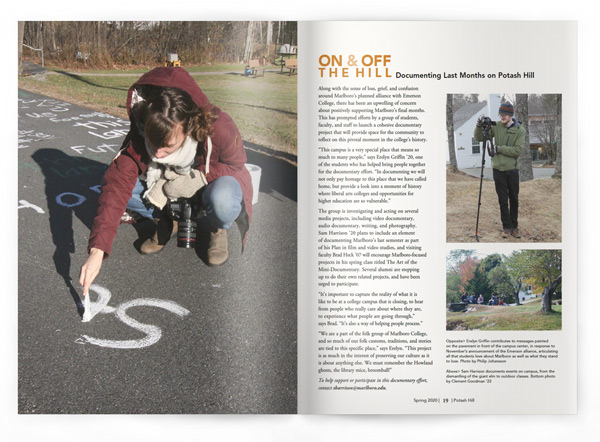
Documenting Last Months on Potash Hill
Along with the sense of loss, grief, and confusion around Marlboro’s planned alliance with Emerson College, there has been an upwelling of concern about positively supporting Marlboro’s final months. This has prompted efforts by a group of students, faculty, and staff to launch a cohesive documentary project that will provide space for the community to reflect on this pivotal moment in the college’s history.
“This campus is a very special place that means so much to many people,” says Erelyn Griffin ’20, one of the students who has helped bring people together for the documentary effort. “In documenting we will not only pay homage to this place that we have called home, but provide a look into a moment of history where liberal arts colleges and opportunities for higher education are so vulnerable.”
The group is investigating and acting on several media projects, including video documentary, audio documentary, writing, and photography. Sam Harrison ’20 plans to include an element of documenting Marlboro’s last semester as part of his Plan in film and video studies, and visiting faculty Brad Heck ’07 will encourage Marlboro-focused projects in his spring class titled The Art of the Mini-Documentary. Several alumni are stepping up to do their own related projects, and have been urged to participate.
“It’s important to capture the reality of what it is like to be at a college campus that is closing, to hear from people who really care about where they are, to experience what people are going through,” says Brad. “It’s also a way of helping people process.”
“We are a part of the folk group of Marlboro College, and so much of our folk customs, traditions, and stories are tied to this specific place,” says Erelyn. “This project is as much in the interest of preserving our culture as it is about anything else. We must remember the Howland ghosts, the library mice, broomball!”
To help support or participate in this documentary effort, contact sharrison@marlboro.edu.
Campus Visits Promote Understanding
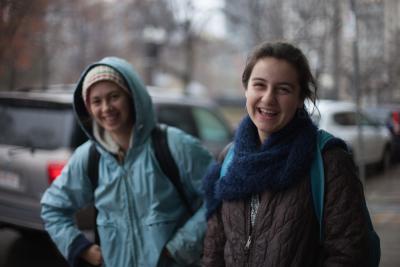 The November announcement of the alliance between Marlboro College and Emerson College has been followed by a series of visits by members of both campuses, helping to build relationships and a common understanding of the future of Marlboro. The first of these visits was on November 20, when five members of the Emerson leadership visited Marlboro to answer questions and get a feel for the mood of the campus around the proposed alliance.
The November announcement of the alliance between Marlboro College and Emerson College has been followed by a series of visits by members of both campuses, helping to build relationships and a common understanding of the future of Marlboro. The first of these visits was on November 20, when five members of the Emerson leadership visited Marlboro to answer questions and get a feel for the mood of the campus around the proposed alliance.
“Our students and you share some commonalities,” said Emerson President Lee Pelton, who addressed Town Meeting on behalf of the visitors. “They see in Emerson a place of magic, a place of creativity, a place where there are independent-minded people, and where students have agency. And my sense is that many of those characteristics are common to those of you who decided to come to Marlboro.”
Pelton expressed optimism that Marlboro students and faculty and their counterparts at Emerson could work together to create an academic program of excellence. In addition to attending Town Meeting, the visitors lunched with faculty, met with faculty committees, listened to senior Plan presentations, and concluded their visit by having tea with students to respond more specifically to their concerns.
That visit was followed with a trip by 40 students and faculty to Emerson’s Boston campus on November 24, to get a tour of campus facilities, meet some students, talk about curriculum, and see an ArtsEmerson production of An Iliad. This visit was facilitated by Marlboro life trustee and former staff and faculty member Ted Wendell, who has also been a longtime supporter of ArtsEmerson.
“This was a way of introducing to Marlboro some of the richness that Emerson has to offer and getting them on the actual campus,” Ted said in an interview with the Emerson student publication the Berkeley Beacon. “I think getting the two parties to get to know each other and start to understand the strengths and values of each other is the best way to have it be smooth and fruitful for both sides—to have this new relationship prosper.”
Building on these experiences, a group of Marlboro students invited students from Emerson College to enjoy part of Thanksgiving break on Potash Hill, and 10 students from Emerson came to Marlboro for two nights. They shared meals together, including Thanksgiving dinner, and explored and connected with the particular sense of place that is uniquely Marlboro.
Marlboro senior Adam Weinberg, who orchestrated the Thanksgiving visit, felt the brief trip brought some profound moments for shared reflection—from face to face engagement, to appreciation for Marlboro’s spirit of trust and open access to facilities, to theoretical questions of “Why liberal arts?” and “What does it mean to explore across fundamental questions?” The morning before returning to Boston, the students expressed great thanks for Marlboro’s sincere hospitality along with a heartfelt promise to hang out again, soon.
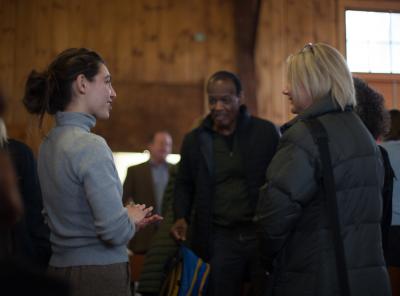 Emerson staff in admissions, student success, and other departments visited campus in January to meet with Marlboro students and discuss their potential transition to Emerson’s community. Students were also welcomed to Emerson for a group visit on February 14, and ongoing individual visits throughout the spring 2020 term, to experience the college’s community, offerings, and classes.
Emerson staff in admissions, student success, and other departments visited campus in January to meet with Marlboro students and discuss their potential transition to Emerson’s community. Students were also welcomed to Emerson for a group visit on February 14, and ongoing individual visits throughout the spring 2020 term, to experience the college’s community, offerings, and classes.
There have been several exchanges of faculty visits as well, starting with visits to Emerson in the week of December 2 and return visits to Marlboro in the week of December 16. These have been valuable opportunities to learn more about where Marlboro faculty will fit into Emerson’s programs and departments, how the curriculum for the new Marlboro Institute is expanding to embrace them, and what resources and facilities are available to them.
“As we enthusiastically shared ideas and goals, I wished our community could see the good will and compassion with which we were greeted by students, staff, and faculty,” said theater and gender studies professor Brenda Foley, following her first visit to Emerson. “Working with faculty peers at Emerson on our alliance convinced me that the coming together is far more than a pact ‘in name only.’ It promises an opportunity to carry with us intrinsic elements of a Marlboro education we hold dear, leave behind aspects that are no longer productive, engage with a more diverse cohort, and conceive of expansive and exciting new projects.”
The visits will continue to fill in the gaps between two cultures, between two campuses, and between idealistic hopes and concrete plans. “I feel fortunate to be making the journey with so many of my Marlboro faculty colleagues and students and look forward to the transformation to come,” added Brenda.
Working Groups Get Down to Details
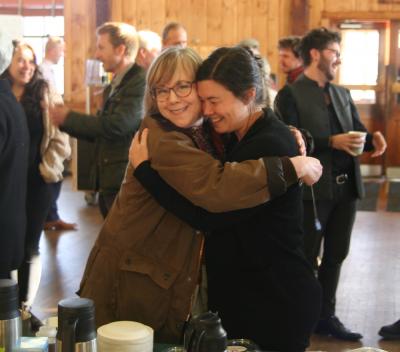 Following quickly on the announcement of Marlboro’s alliance with Emerson College, working groups were formed to consider options and advocate solutions for key constituencies and interests, including students, faculty, staff, and the future of the campus. Most working groups took advantage of committees already engaged in advocating for these groups, and included trustees, faculty, staff, students, and, in the case of the campus working group, alumni. The student working group has the goal of charting the smoothest possible transition for students to Emerson or another institution of their choice, and of aligning student data with Emerson’s systems.
Following quickly on the announcement of Marlboro’s alliance with Emerson College, working groups were formed to consider options and advocate solutions for key constituencies and interests, including students, faculty, staff, and the future of the campus. Most working groups took advantage of committees already engaged in advocating for these groups, and included trustees, faculty, staff, students, and, in the case of the campus working group, alumni. The student working group has the goal of charting the smoothest possible transition for students to Emerson or another institution of their choice, and of aligning student data with Emerson’s systems.
The group is made up of the Dean’s Advisory Committee as well as Dean of Students Patrick Connelly, Dean of Admissions Fumio Sugihara, trustee and parent Susan Wefald, Director of Financial Aid Kristin Hielmenski, Registrar Cathy Fuller, IT Director Michael Riley ’09, and religion professor Amer Latif.
“We arranged four listening sessions with students in November and December, to allow students to voice their opinion regarding the proposed alliance and answer any questions,” said Patrick, who held the sessions. “They were well received, and helped lessen student anxiety about the alliance.” Student Life has increased social programming and events on campus in order to engage students in a healthy and productive way, and added additional counselors to the Total Health Center to support students feeling challenged by their next steps.
The working group has helped orchestrate visits between Marlboro students and Emerson staff and students (see page 20), and provided information about housing and financial aid to students and families transitioning to Emerson. In January the college announced that it would cover the difference in housing costs for students going on to Emerson, removing a huge barrier for many students. The working group has also supported the negotiation of transfer options with four other institutions—College of the Atlantic, Bennington College, Castleton University, and Saint Michael’s College— waiving application fees and other transfer requirements and offering comparable financial aid.
“We understand students have various preferences and needs in meeting their academic goals, and that for some students transferring to an institution other than Emerson may be their best path forward,” said Fumio. “Admissions will support any student interested in transferring to an institution other than the Marlboro Institute at Emerson.” The college has agreed to pay application fees for students transferring to other, non-partnered colleges.
The working group on faculty includes members of the Committee on Faculty, Curriculum Committee, and faculty and students from the Strategic Options Task Force, as well as Provost and Dean of Faculty Richard Glejzer and trustee Donna Heiland. This group has the task of clarifying curricular requirements for students and developing an advising program for transition to Emerson. Working with their counterparts at Emerson, they have been building a four-year program that incorporates significant aspects of Marlboro’s curriculum, including an emphasis on writing and individualized study that will draw upon Marlboro’s tutorial model.
“It has been heartening to see how Emerson faculty eagerly welcome the expertise of Marlboro faculty in designing and implementing a new four-year degree program that includes individualized study,” says Richard. “Marlboro faculty have been driving the conversation on the curriculum, while learning from their counterparts about Emerson students and the spaces they will be working in.” The working group presented a proposal to Emerson in February, which then needs to work its way through Emerson’s governance structure for final approval.
The working group on staff has the task of stewarding the staff through the transition, and supporting staff well-being during what is admittedly a difficult time. This group is made up of the Committee on Staff and the Benefits Committee, and also includes COO Becky Catarelli and trustee and alumni parent Kirsten Malone.
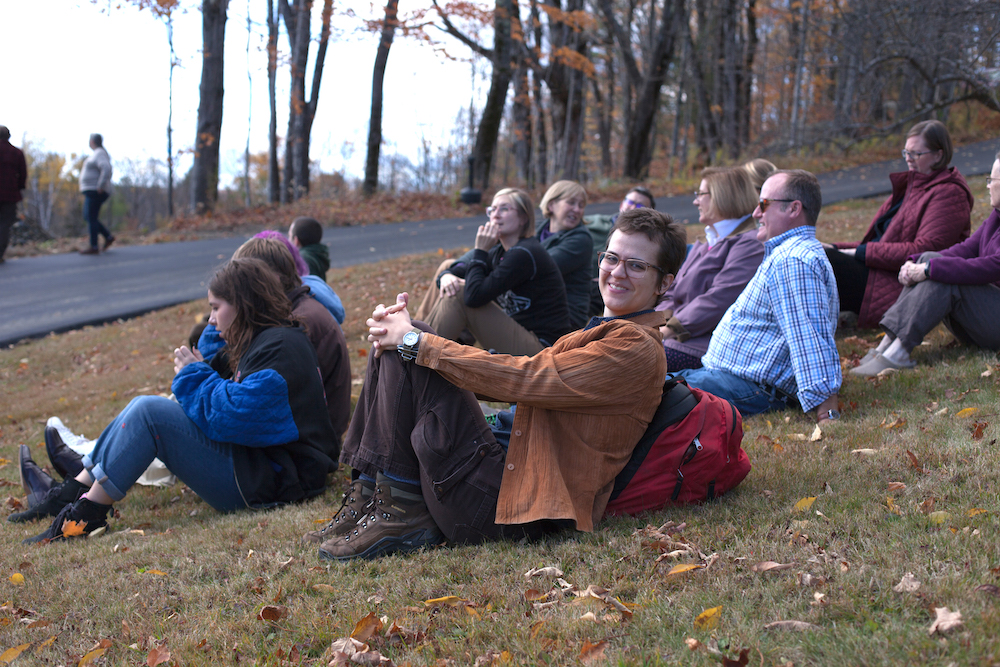 Based on the advocacy of this group, in December the board of trustees unanimously approved a severance policy for staff that was considered generous by almost any measure. The group has also been actively finding ways to support staff in terms of placement in other jobs after the Marlboro campus closes.
Based on the advocacy of this group, in December the board of trustees unanimously approved a severance policy for staff that was considered generous by almost any measure. The group has also been actively finding ways to support staff in terms of placement in other jobs after the Marlboro campus closes.
“We are thrilled with the unstinting severance policy adopted by the trustees, and it was only made possible by the vigilance of this group,” says Becky. “We realize that, of all constituents, the staff is most affected by this alliance and want them to know that we are doing all we can to soften the blow.”
Perhaps the group that has attracted the most attention and interest of other constituencies, including alumni and Marlboro townspeople, is the campus working group. The group is chaired by two alumni, Sara Coffey ’10 and Dean Nicyper ’76, and includes faculty, staff, and students as well as Alumni Council member Randy George ’93, Marlboro Town Selectman Jesse Kreitzer, and trustees Dick Saudek and Phil Steckler.
In an email to members of the working group, Sara Coffey, a Vermont state representative who served on the board of trustees for several years, said “Each of us has a deep connection to the college, and we know many of us are feeling a great loss, so this is a challenging task, but a very important one. The aim of this working group is to develop a process for gathering community input and proposals for the future use of the Marlboro College campus.”
“It sounds really simple, but as you can imagine, all the different factors that are involved in what happens on campus make it very complex,” says Nikolas Katrick ’07, MSM’16, Outdoor Program director and one of the staff representatives. “We’re trying to find great proposals that can utilize this campus and also possibly mesh together with other proposals. Anybody can submit proposals, but the working group isn’t going to workshop someone’s idea and make it viable. We don’t have the capacity to do that.”
Specifically, the working group has invited proposals for ownership and use of the Marlboro campus that will provide a significant benefit to the Marlboro community and result in a payment consistent with the campus fair market value. Any proposal must also be consistent with the terms of the Marlboro Music Festival lease and any amendments. The plan is to present the most viable proposals for review and approval by the Marlboro board of trustees, or by Emerson if they are presented after the merger.
“We have heard of widespread interest from various groups who are interested in finding some way to continue to have a managed trail network and preserve the Marlboro College Ecological Reserve,” says Sara. “These will be considerations as we move forward.” Each working group member has been collecting proposals from their respective constituents, and coordinating with state officials and counterparts at Emerson as necessary.
For more information about submitting a proposal, visit marlboro.edu/CWG. Proposals will be reviewed on a rolling basis and will be held in the strictest confidence.
Alumni Association Revival
After years of absence, the Marlboro College Alumni Association was revived last fall with the full support of the college, thanks to renewed passion among Marlboro’s alumni community and a core of committed alumni who took on the hard work of grassroots organizing. Given the possible transfer of Marlboro’s faculty, students, and pedagogy to the Marlboro Institute for Liberal Arts and Interdisciplinary Studies at Emerson College, this alumni revival came not a moment too soon.
“During this crucial time for the college, we recognize the importance of coming together,” says an October statement from members of the interim council, which now includes Heather Bryce ’04, John Coakley ’02, Daniel Doolittle ’95, Randy George ’93, Cate Marvin DuPont ’93, and Jessica Taraski ’91. The group met with 27 alumni on campus for Home Days in September, and has heard from hundreds more since then through their website and social media presence.
“We consider ourselves an interdependent association,” says Daniel. “We are independent of the college, but collaborate with the administration and trustees to share the voice of their largest constituency.” Marlboro has about 5,000 alumni, and nearly 600 had opted in as members of the association as of January—more than 10 percent in four months—ranging in class year from 1959 to 2019.
The interim council plans to have open, democratic elections for council positions in 2020, and to work in concert with the college to support alumni as well as archive their rich Marlboro memories. In the meantime, the council has made great strides in forming committees and connecting with alumni, the college administration, campus community, and trustees—one member, Randy George, is on the Campus Working Group, and a November survey by the council highlighted alumni priorities.
“It’s an incredibly interesting time,” says Daniel. “At first we were just launching the foundation to engage alumni, now we are retooling to serve changing alumni needs. We have to organize toward a completely different reality.” The Alumni Association helped make the Drop Some Love on Campus campaign a success, for example, and spread the word on the open session at December’s trustee meeting, providing alumni and other constituents access to the trustees. “One of our most important purposes is to serve as some sort of memory archive, or memory vessel, of the Marlboro experience.”
“The association gives alumni a space, which has long been absent, to process the potential closure of the college or work for different possible futures,” says John Coakley ’02, another interim council member. “No matter what happens to the Marlboro name, or the campus on Potash Hill, the Alumni Association will be there to provide that home. Marlboro’s alumni will not disappear, and their memories will only become more important in the future.”
Alumni Drop Some Love
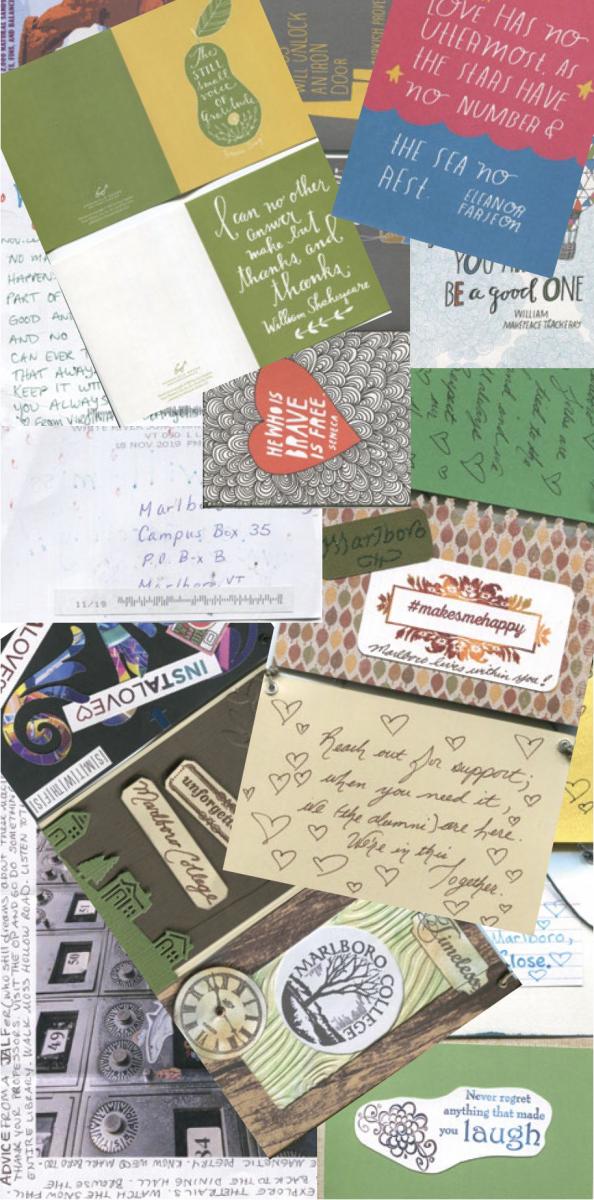 In November and December, just when it was needed most, the Marlboro College Alumni Association announced a Drop Some Love on Campus campaign, inspiring dozens of alumni to share their well-wishes and Marlboro stories with students, faculty, and staff. Postcards, handmade note cards, and photocopied photographs appeared on campus and were distributed by student collaborator Felix Bieneman ’21 and friends. Here is a small sampling of the bounteous love and deep Marlboro history.
In November and December, just when it was needed most, the Marlboro College Alumni Association announced a Drop Some Love on Campus campaign, inspiring dozens of alumni to share their well-wishes and Marlboro stories with students, faculty, and staff. Postcards, handmade note cards, and photocopied photographs appeared on campus and were distributed by student collaborator Felix Bieneman ’21 and friends. Here is a small sampling of the bounteous love and deep Marlboro history.
A Home Days to Remember
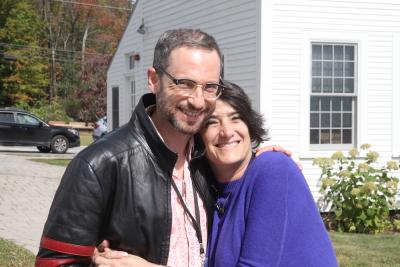 The Marlboro College campus was inundated with alumni and good vibes for Home Days 2019, September 27 through 29, an opportunity to remember, reflect, and support the college. Eager alumni came from as far away as Texas and California, and spanned over 50 graduation years, from 1968 to 2019.
The Marlboro College campus was inundated with alumni and good vibes for Home Days 2019, September 27 through 29, an opportunity to remember, reflect, and support the college. Eager alumni came from as far away as Texas and California, and spanned over 50 graduation years, from 1968 to 2019.
“It was incredible to see campus jam-packed with alumni,” says Maia Segura ’91, director of alumni engagement. The event raised over $6,000 for Marlboro, and provided a full measure of solidarity for this key constituency. “It was a ‘best of Marlboro’ day, and the love and support for our community has been overwhelming.”
Highlights included a packed house for the Alumni Dance Showcase in Whittemore Theater, featuring the work of nine alumni dancers at the height of their game, and standing room only in the dining hall for politics professor Meg Mott’s lecture on the First Amendment. A “Kevin Unplugged” session offered alumni the opportunity to hear directly from the college president about the status of merger negotiations, and to express their ideas and support. At the festive Saturday night dinner, Allison Turner MS’99 received the 2019 Roots Award recognizing her outstanding service to the Marlboro College community.
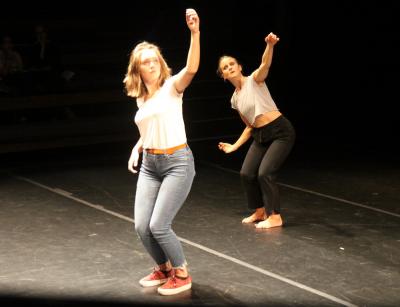 “I was very moved by the programming and energy on the Hill,” says alumna and trustee Heatherjean MacNeil ’02. “It was a stark reminder of why Marlboro is so deeply important to me, and of its ability to cultivate such an amazing community that is driven by talented and caring individuals.”
“I was very moved by the programming and energy on the Hill,” says alumna and trustee Heatherjean MacNeil ’02. “It was a stark reminder of why Marlboro is so deeply important to me, and of its ability to cultivate such an amazing community that is driven by talented and caring individuals.”
Find more photos on our flickr page. See a sampling from the Alumni Dance Showcase on Vimeo.
Alumni Get Crafty in Japan
A small group of alumni was preparing to embark on a two-week trip to Japan in May, led by Asian studies and history professor Seth Harter, before their plans were foiled by the coronavirus outbreak in Asia. Now they are setting their sights on running the trip, titled The Enigmatic Beauty of Japanese Craft, in 2021.
“Ever since the first round of Freeman Foundation– funded trips to Asia, I have been hearing from alumni wishing they could take part in such college-sponsored adventures,” says Seth. “Other colleges have been doing this for decades, but we will do it in a uniquely Marlboro way: relatively low budget, very small scale, personal encounters with brilliant, dedicated people,” says Seth.
While traveling through the heart of central Japan, participants will explore the question: how can contemporary crafts navigate between the realms of industry and fine art? They will encounter 1,300- year-old wooden temples, austere Zen rock gardens, traditional ceramics, and flamboyant textiles, exploring from the cosmopolitan hubs of Kyoto and Tokyo to the grass-thatched huts of mountain villages. The itinerary is inspired by Seth’s 2017 trip to Japan with Salvatore Annunziato ’18 (see Potash Hill Fall 2018), and his more recent sabbatical there in spring 2018.
“This trip will be an opportunity to build community, at a time when the community is feeling a bit besieged,” says Seth. “We have all been asking ourselves what parts of Marlboro will be able to endure the merger process. I think this is one thing that could flourish beyond next year, and I hope it can be reproduced by other people with other themes in other parts of the world.”
Campus Acknowledges Abenaki Homeland
In the week leading up to October 14, the first official Indigenous Peoples’ Day in Vermont, campus community members were encouraged by the Diversity and Inclusion Task Force to examine their own role in dismantling colonialism. To start with, they were asked to make a general practice of acknowledging the Sokoki (Western Abenaki) people in whose homeland Marlboro College stands.
“Land acknowledgments are often given at the beginning of public events, or in my case at the beginning of my courses,” says anthropology professor Nelli Sargsyan. “Their intention is to bring into our collective awareness the Indigenous people who have been living here and the histories of various kinds that we, as settlers, have inherited as a way of grounding.”
Land acknowledgement was one of several ways that the task force called on the Marlboro College community to observe Indigenous Peoples’ Day. Community members were also urged to do their own research to find out more about the Sokoki people and Abenaki people in general, their history, and what some of them are up to now. Further, they were encouraged to explore their own relationships to this territory, and how they came to be here.
“Our acknowledgement needs to come with a commitment, and not be something we do because it is trendy or to check a box of things progressive institutions do,” says Nelli. At Town Meeting she shared some of the recent history of this area and the impacts of colonialism, including the Vermont Eugenics Survey and systematic sterilization, and offered resources to learn more. “We each need to ask ourselves, ‘What intentions do I have to disrupt and dismantle colonialism beyond this land acknowledgement?’”
EV Charging Comes to Potash Hill
In September, Marlboro College installed an electric vehicle (EV) charging station in the admissions parking lot, a boon to students, faculty, staff, and visitors with electric or plug-in hybrid vehicles. This forward-thinking addition to campus is thanks to a Vermont State grant, as well as funds from an anonymous private donor that were dedicated to environmental stewardship and sustainability.
“Environmental sustainability is something Marlboro College has taken very seriously, from making dorms energy efficient to composting our food waste,” says chemistry professor Todd Smith, who served in the role of sustainability project manager last academic year. “The EV charging station is a very visible way of staking this claim, and encouraging the use of electric vehicles. Transportation is the single biggest contributor to greenhouse gases in Vermont, so this is one small step toward reducing that component of our ecological footprint.”
Marlboro College was one of nine locations in Vermont that received awards from a $400,000 Electric Vehicle Supply Equipment (EVSE) Grant Program last year. The grant application was an example of the college’s shared governance in action, with Todd working with Environmental Quality Committee members Amber Hunt and Matt Ollis as well as Hillary Twining, director of corporate and foundation relations. The new EV charging station will be part of a statewide network of publicly available charging stations that drivers can locate through an app.
Events
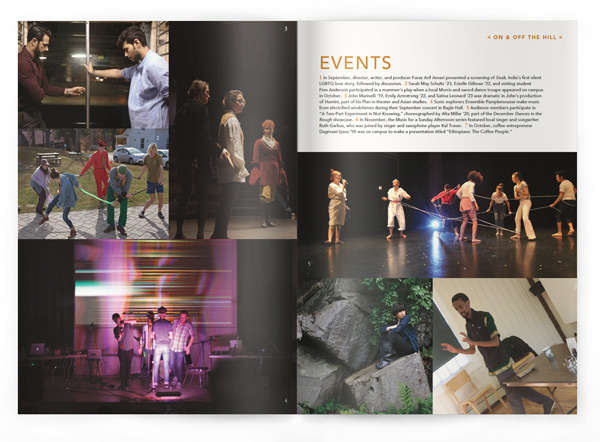
1 In September, director, writer, and producer Faraz Arif Ansari presented a screening of Sisak, India’s first silent LGBTQ love story, followed by discussion. 2 Sarah May Schultz ’23, Estelle Gillman ’22, and visiting student Finn Anderson participated in a mummer’s play when a local Morris and sword dance troupe appeared on campus in October. 3 John Marinelli ’19, Emily Armstrong ’22, and Sativa Leonard ’23 wax dramatic in John’s production of Hamlet, part of his Plan in theater and Asian studies. 4 Sonic explorers Ensemble Pamplemousse make music from electrified windchimes during their September concert in Ragle Hall. 5 Audience members participate in “A Two-Part Experiment in Not Knowing,” choreographed by Alta Millar ’20, part of the December Dances in the Rough showcase. 6 In November, the Music for a Sunday Afternoon series featured local singer and songwriter Ruth Garbus, who was joined by singer and saxophone player Kal Traver. 7 In October, coffee entrepreneur Dagmawi Iyasu ’98 was on campus to make a presentation titled “Ethiopians: The Coffee People."
Focus on Faculty
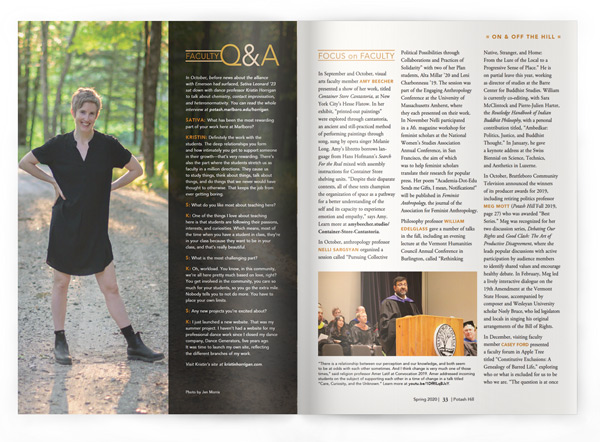
FacultyQ&A
In October, before news about the alliance with Emerson had surfaced, Sativa Leonard ’23 sat down with dance professor Kristin Horrigan to talk about chemistry, contact improvisation, and heteronormativity. You can read the whole interview at potash.marlboro.edu/horrigan.
Sativa: What has been the most rewarding part of your work here at Marlboro?
Kristin: Definitely the work with the students. The deep relationships you form and how intimately you get to support someone in their growth—that’s very rewarding. There’s also the part where the students stretch us as faculty in a million directions. They cause us to study things, think about things, talk about things, and do things that we never would have thought to otherwise. That keeps the job from ever getting boring.
S: What do you like most about teaching here?
K: One of the things I love about teaching here is that students are following their passions, interests, and curiosities. Which means, most of the time when you have a student in class, they’re in your class because they want to be in your class, and that’s really beautiful.
S: What is the most challenging part?
K: Oh, workload. You know, in this community, we’re all here pretty much based on love, right? You get involved in the community, you care so much for your students, so you go the extra mile. Nobody tells you to not do more. You have to place your own limits.
S: Any new projects you’re excited about?
K: I just launched a new website. That was my summer project. I haven’t had a website for my professional dance work since I closed my dance company, Dance Generators, five years ago. It was time to launch my own site, reflecting the different branches of my work.
Visit Kristin’s site at kristinhorrigan.com. Photo by Jen Morris
In September and October, visual arts faculty member Amy Beecher presented a show of her work, titled Container Store Cantastoria, at New York City’s Hesse Flatow. In her exhibit, “printed-out paintings” were explored through cantastoria, an ancient and still-practiced method of performing paintings through song, sung by opera singer Melanie Long. Amy’s libretto borrows language from Hans Hofmann’s Search For the Real mixed with assembly instructions for Container Store shelving units. “Despite their disparate contexts, all of these texts champion the organization of space as a pathway for a better understanding of the self and its capacity to experience emotion and empathy,” says Amy. Learn more at amybeecher.studio/Container-Store-Cantastoria.
In October, anthropology professor Nelli Sargsyan organized a session called “Pursuing Collective Political Possibilities through Collaborations and Practices of Solidarity” with two of her Plan students, Alta Millar ’20 and Leni Charbonneau ’19. The session was part of the Engaging Anthropology Conference at the University of Massachusetts Amherst, where they each presented on their work. In November Nelli participated in a Ms. magazine workshop for feminist scholars at the National Women’s Studies Association Annual Conference, in San Francisco, the aim of which was to help feminist scholars translate their research for popular press. Her poem “Academia-Dot-Edu Sends me Gifts, I mean, Notifications!” will be published in Feminist Anthropology, the journal of the Association for Feminist Anthropology.
Philosophy professor William Edelglass gave a number of talks in the fall, including an evening lecture at the Vermont Humanities Council Annual Conference in Burlington, called “Rethinking Native, Stranger, and Home: From the Lure of the Local to a Progressive Sense of Place.” He is on partial leave this year, working as director of studies at the Barre Center for Buddhist Studies. William is currently co-editing, with Sara McClintock and Pierre-Julien Harter, the Routledge Handbook of Indian Buddhist Philosophy, with a personal contribution titled, “Ambedkar: Politics, Justice, and Buddhist Thought.” In January, he gave a keynote address at the Swiss Biennial on Science, Technics, and Aesthetics in Luzerne.
In October, Brattleboro Community Television announced the winners of its producer awards for 2019, including retiring politics professor Meg Mott (Potash Hill Fall 2019) who was awarded “Best Series.” Meg was recognized for her two discussion series, Debating Our Rights and Good Clash: The Art of Productive Disagreement, where she leads popular discussions with active participation by audience members to identify shared values and encourage healthy debate. In February, Meg led a lively interactive dialogue on the 19th Amendment at the Vermont State House, accompanied by composer and Wesleyan University scholar Neely Bruce, who led legislators and locals in singing his original arrangements of the Bill of Rights.
In December, visiting faculty member Casey Ford presented a faculty forum in Apple Tree titled “Constitutive Exclusions: A Genealogy of Barred Life,” exploring who or what is excluded for us to be who we are. “The question is at once biological, affective, cultural, and political,” says Casey. “Running through each domain is a philosophical concern: to be something involves an essential relation to otherness which is not simply co-present but exclusionary.” Casey’s research project examines the specific role that “exclusion” has played in the way we have, in the West, conceived of the founding and sustaining of political community.
Spanish language and literature professor Rosario de Swanson was invited to participate in the Brattleboro Literary Festival in October, where she appeared on a panel discussion about literature and race with award-winning writers Michael Datcher and Jess Row, moderated by philosophy professor William Edelglass. She also served as a visiting professor at Bennington College for the fall, teaching a course titled Literature as Resistance: The Works of Rosario Castellanos. Given her record of publications on Latin American literature, Rosario was invited to do book reviews for Hispania, the official journal of the American Association of Teachers of Spanish and Portuguese, the first of which was due to come out in December.
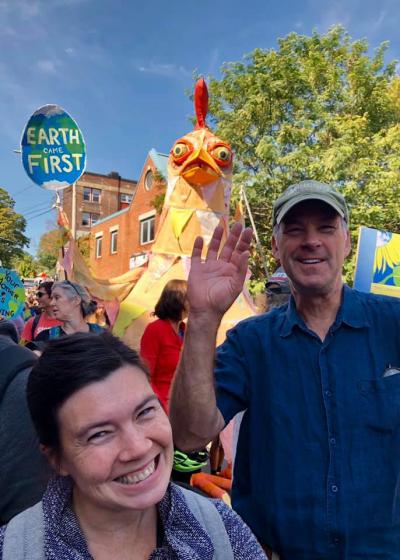 In January, literature and writing professor Rituparna Mitra presented papers in two panels, titled “The Other South Asia” and “Representational Challenges in Postcolonial Urban Studies,” at the Modern Language Association’s annual meeting in Seattle. In March, she presented a paper and co-organized a panel titled “Fictions of the Neoliberal City” at the American Comparative Literature Association’s Annual Meeting in Chicago, and also presented on the panel “Environmental Trauma and Postcolonial Writing” at the Northeast Modern Language Association’s Annual Convention in Boston. Rituparna’s essay “Precarious Duniyas: Post-Human Subjectivity and Alterglobal Politics in The Ministry of Utmost Happiness” will be published in a Postcolonial Studies special issue on “Alterglobal Politics: Postcolonial Theory in the Era of the Anthropocene and the Nonhuman.”
In January, literature and writing professor Rituparna Mitra presented papers in two panels, titled “The Other South Asia” and “Representational Challenges in Postcolonial Urban Studies,” at the Modern Language Association’s annual meeting in Seattle. In March, she presented a paper and co-organized a panel titled “Fictions of the Neoliberal City” at the American Comparative Literature Association’s Annual Meeting in Chicago, and also presented on the panel “Environmental Trauma and Postcolonial Writing” at the Northeast Modern Language Association’s Annual Convention in Boston. Rituparna’s essay “Precarious Duniyas: Post-Human Subjectivity and Alterglobal Politics in The Ministry of Utmost Happiness” will be published in a Postcolonial Studies special issue on “Alterglobal Politics: Postcolonial Theory in the Era of the Anthropocene and the Nonhuman.”
In addition to his new book, Mni Wiconi, photography professor John Willis also published an updated and expanded edition of his 2010 book Views from the Reservation (George F. Thompson Publishing) in September, based on his more than 25 years of visiting Pine Ridge Reservation. Along with his insightful and accomplished images, John has enlisted other voices to offer a more complete story, from powerful poems by Lakota elders and high school students to a story of growing up on the reservation by Emil Her Many Horses, a curator at the National Museum of the American Indian.
Theater professor Brenda Foley collaborated this past year on The Audacity: Women Speak, a play produced by Sleeping Weazel theater company. The play, which highlights real stories of women’s experiences with gender-biased treatment and sexual harassment, systemic misogyny and sexism, and assault and rape, was named by the Boston Globe as one of the ten best of 2019. Also, Routledge Publishing has selected Brenda’s book A Legacy of Violence: Women, Mental Illness, and Performance to be one of their open access texts.
Keep an eye peeled for Sisters Rising (nee Arming Sisters, Potash Hill Spring 2015), the film by visiting professor of film and video studies Brad Heck ’04 and partner Willow O’Feral ’07, making this year’s festival circuit. The film, which documents a grassroots movement to end sexual violence against indigenous women and shares the stories of survivors fighting for positive change, was invited to premiere at Big Sky Film Festival in Missoula, Montana, in February. It was also slated for a California premiere at California’s American Indian & Indigenous Film Festival, and there will be more coming. Learn more at SistersRisingMovie.com.
![]()
Also of Note
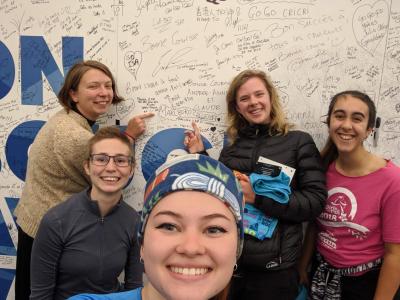 Congratulations go to five students (right) who participated in Je Cours Québec in October, a series of five major running events in the heart of picturesque Quebec City and the surrounding area. Anna Morrissey ’20 and Gina Trevethan ’22 both ran in the 5k event, while Sage Kampitsis ’20, Jenny Stofer ’20, and Claire O’Pray ’20 all participated in the 10k run. The students representing Marlboro College joined 8,400 other runners who followed the picture-postcard course alongside trees in their fall colors and some of Quebec City’s most iconic attractions.
Congratulations go to five students (right) who participated in Je Cours Québec in October, a series of five major running events in the heart of picturesque Quebec City and the surrounding area. Anna Morrissey ’20 and Gina Trevethan ’22 both ran in the 5k event, while Sage Kampitsis ’20, Jenny Stofer ’20, and Claire O’Pray ’20 all participated in the 10k run. The students representing Marlboro College joined 8,400 other runners who followed the picture-postcard course alongside trees in their fall colors and some of Quebec City’s most iconic attractions.
Two Marlboro seniors presented on their Plan research in December at 118 Elliot, in Brattleboro, hosted by the Windham World Affairs Council. Leni Charbonneau’s talk, titled “Japan and the Ainu: A Spectacle of Sustainability,” focused on the Japanese government’s recent policies regarding the indigenous Ainus, carried out under the rubric of sustainable development. Adam Weinberg presented on “Compassion for the Inconsiderate: Local Politics, Global Values,” in which he explained how resentment and vindictiveness, not disagreement, must be dealt with in order to stop cycles of retribution, using Marlboro College’s Community Court as a case study,
In December, first-year student Darien Young Man Who Is Afraid of His Horses presented a workshop titled Lakota Ways of Knowing with her mother, Davidica Little Spotted Horse, an activist and cultural advisor on Pine Ridge Reservation. The workshop supported the theme of this year’s First Year Seminars, which studied several different approaches to “ways of knowing.” “Focus has been on how knowledge is created through community, as well as what knowledge has been buried and needs to be excavated,” said Catherine O’Callahan, assistant dean of academic advising and support, who helped organize the workshop. “This was a rare opportunity to learn about a profound culture and its history.”
In September, seniors Chris Tripp and Nick Creel gave a presentation to the community about their summer internships under the National Science Foundation’s Research Experience for Undergraduates program. Chris (pictured right) described his research on “linear independence of algebraic curvature tensors in the higher-signature setting,” a project at California State University at San Bernardino, and how it ties in with his Plan in mathematics. Nick, who is completing a Plan in computer science, writing, and classics, discussed his work at the University of Rochester, conducting research in the emerging field of computer audition—designing systems that can analyze and understand sounds.
Following a lapse of a couple years, the Committee on Staff accepted nominations in November for three Distinguished Service Awards, which recognize staff for their commitment to the community and to the Marlboro College mission. The winners, announced in January, were Margaret Hunt, Tanner Jones, and K.P. Peterson, who were each awarded a $250 prize. Margaret, the longtime faculty administrative assistant, was nominated based on her ability to make things happen on short notice, from providing food for faculty gatherings to shopping for gifts for children at the college holiday party. “Even when things may be frustrating, she always has a smile on her face,” her nomination said. “Who cannot help but love her?” Tanner, the director of residence life, was recognized for working tirelessly to make sure students are safe and taken care of, and for treating everyone with respect. His nomination said, “He literally does everything imaginable for this college. I truly believe this place would not be functioning without him.” Last but not least, longtime master electrician K.P. was nominated because, “Not only does she basically run this place, but she is an absolute kickass, badass person. K.P. is part of the heart and soul of Marlboro, and literally keeps the lights on here.”
Frybread Friends 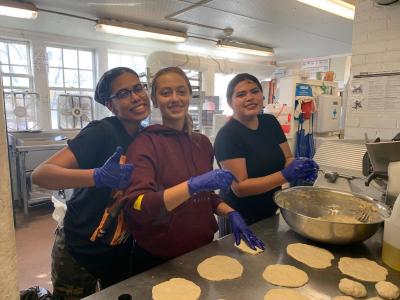 To honor Indigenous Peoples’ Day in October, students Karla Julia Ramos ’20 and Nicktae Marroquin-Haslett ’20 learn to make frybread from scratch using the family recipe of Lakota student Darien Young Man Who Is Afraid of His Horses ’22.
To honor Indigenous Peoples’ Day in October, students Karla Julia Ramos ’20 and Nicktae Marroquin-Haslett ’20 learn to make frybread from scratch using the family recipe of Lakota student Darien Young Man Who Is Afraid of His Horses ’22.
Preparing for Winter Pranit Chand ’23 and Malaya Wright ’23 prepare to spread compost on the community garden, before planting a winter cover crop, during Work Day in October.
Brightening Up Menefese Kudumu-Clavell ’20 and Angie Pham ’23 explore the possibilities of tie-dyed t-shirts on a gloomy September afternoon, one of several daytime activities designed by the student life team.
Alumni News
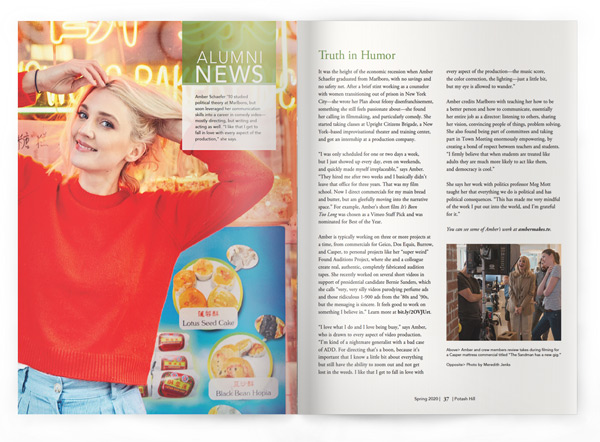
Truth in Humor
Amber Schaefer ’10 studied political theory at Marlboro, but soon leveraged her communication skills into a career in comedy video— mostly directing, but writing and acting as well. “I like that I get to fall in love with every aspect of the production,” she says.
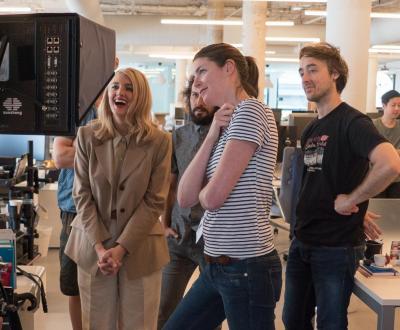 It was the height of the economic recession when Amber Schaefer graduated from Marlboro, with no savings and no safety net. After a brief stint working as a counselor with women transitioning out of prison in New York City—she wrote her Plan about felony disenfranchisement, something she still feels passionate about—she found her calling in filmmaking, and particularly comedy. She started taking classes at Upright Citizens Brigade, a New York–based improvisational theater and training center, and got an internship at a production company.
It was the height of the economic recession when Amber Schaefer graduated from Marlboro, with no savings and no safety net. After a brief stint working as a counselor with women transitioning out of prison in New York City—she wrote her Plan about felony disenfranchisement, something she still feels passionate about—she found her calling in filmmaking, and particularly comedy. She started taking classes at Upright Citizens Brigade, a New York–based improvisational theater and training center, and got an internship at a production company.
“I was only scheduled for one or two days a week, but I just showed up every day, even on weekends, and quickly made myself irreplaceable,” says Amber. “They hired me after two weeks and I basically didn’t leave that office for three years. That was my film school. Now I direct commercials for my main bread and butter, but am gleefully moving into the narrative space.” For example, Amber’s short film It’s Been Too Long was chosen as a Vimeo Staff Pick and was nominated for Best of the Year.
Amber is typically working on three or more projects at a time, from commercials for Geico, Dos Equis, Burrow, and Casper, to personal projects like her “super weird” Found Auditions Project, where she and a colleague create real, authentic, completely fabricated audition tapes. She recently worked on several short videos in support of presidential candidate Bernie Sanders, which she calls “very, very silly videos parodying perfume ads and those ridiculous 1-900 ads from the ’80s and ’90s, but the messaging is sincere. It feels good to work on something I believe in.” Learn more.
“I love what I do and I love being busy,” says Amber, who is drawn to every aspect of video production. “I’m kind of a nightmare generalist with a bad case of ADD. For directing that’s a boon, because it’s important that I know a little bit about everything but still have the ability to zoom out and not get lost in the weeds. I like that I get to fall in love with every aspect of the production—the music score, the color correction, the lighting—just a little bit, but my eye is allowed to wander.”
Amber credits Marlboro with teaching her how to be a better person and how to communicate, essentially her entire job as a director: listening to others, sharing her vision, convincing people of things, problem solving. She also found being part of committees and taking part in Town Meeting enormously empowering, by creating a bond of respect between teachers and students. “I firmly believe that when students are treated like adults they are much more likely to act like them, and democracy is cool.”
She says her work with politics professor Meg Mott taught her that everything we do is political and has political consequences. “This has made me very mindful of the work I put out into the world, and I’m grateful for it.”
You can see some of Amber’s work at ambermakes.tv.
Photo by Meredith Jenks
Class notes are listed by year and include both graduates and nongraduates; the latter are listed under the class with which they are associated.
’69 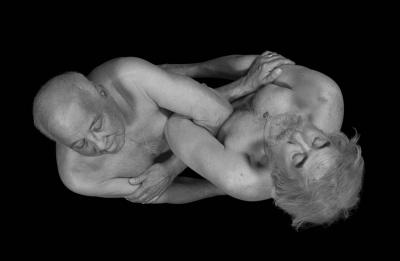 In September and October, JOHN ATCHLEY presented an exhibit of his photographs at the Hunt Library in Falls Village, Connecticut. The exhibit, titled “Tales from the Golden Age and Other Stories,” featured new works incorporating a gold-leaf printing technique developed by John. After receiving a master’s degree in photography at Yale in 1972, John pursued work in construction for 35 years before picking up his camera again in 2010 to focus on his love of nature. See his work at johnatchleyphotography.com.
In September and October, JOHN ATCHLEY presented an exhibit of his photographs at the Hunt Library in Falls Village, Connecticut. The exhibit, titled “Tales from the Golden Age and Other Stories,” featured new works incorporating a gold-leaf printing technique developed by John. After receiving a master’s degree in photography at Yale in 1972, John pursued work in construction for 35 years before picking up his camera again in 2010 to focus on his love of nature. See his work at johnatchleyphotography.com.
’80
“Those who take on risk are not those/ Who bear it. The sign said to profit/As they do, trade around the one/Particular. Let them credit what you hunt,/Let future perform,” writes SOPHIE CABOT BLACK. Her poem “To burn through where you are not yet” was published in the December 2 issue of The New Yorker. Hear Sophie read it.
“A 210-year-young stone farmhouse in southern Pennsylvanian became our new home this year,” writes STEVEN SMITH. “My wife seems determined to farm as much of the six-acre plot as she can and name every deer, groundhog, and baby fox she sees. I am more focused on how to get WiFi to work through two-foot stone walls.”
’84
DANIEL MORRISON writes, “For the past 14 years, I have been the pastor of Huntingdon Valley Presbyterian Church in suburban Philadelphia. I’m married (Eva) and have a nine-year-old daughter (Mia) still at home. Our two 20-somethings (Rosie and Calvin) have long since flown the coop. In addition to my vocational work, I find time for avocational interests, most of which involves digging in archives and library stacks. In other Marlboro news, for the past two years I’ve been shacking up with SAM WOOD ’84. Sam and I lived together in West Philadelphia following my graduation from Marlboro, and fortune again smiled on us to be housemates. Sam writes for the Philadelphia Inquirer, as he has for the past 30 years. He currently works on the business desk and is their marijuana (yes, it is big business) specialist. Sam and I periodically cross paths with KITSIE BURK MALENEY ’84, who also lives near Philadelphia, and, now that she is an empty-nester, devotes her time to running a small farm and fundraising for a homeless shelter. And this past summer, I sat down in a Vermont coffee shop with KATIE KRAMER ’75 to talk about her fascinating intellectual memoir, Missing History: the Covert Education of a Child of the Great Books” (see Potash Hill Summer 2011).
’86
MARK FEINTHEL recently retired from the Virginia branch office of Bloomberg, where he was employed as a research analyst of labor data. He presumably will return to his original path as an artist. For the time being, he is simply enjoying having more time to be with his family, and takes long walks with his dog in the woods. He laments the pending closure of Marlboro, and wishes all his former classmates well.
’89
Congratulations to VAUNE TRACHTMAN and MARCUS DESIENO ’10 for being shortlisted for the Hariban Award, an international competition presented by Benrido Collotype Atelier. “I’m honored to be in the company of so many incredible photographers from around the world!” says Vaune.
Levi Gershkowitz ’11: Patient Advocacy through Storytelling
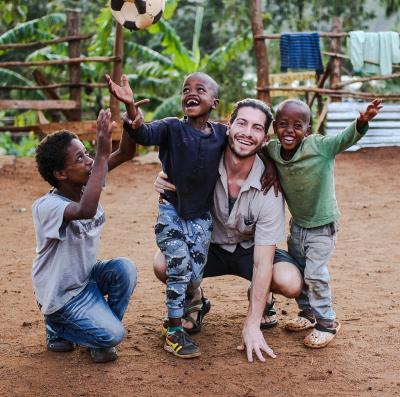 “I’ve been inspired by a love for travel and life’s diversity—encountering cultural views and expressions that I wouldn’t otherwise know,” says Levi Gershkowitz. Levi is founder and CEO of Living in the Light, which uses photography, video, and personal narratives to document the effects of rare genetic diseases on families and individuals. “I was led to patient advocacy through working with refugees,” he says.
“I’ve been inspired by a love for travel and life’s diversity—encountering cultural views and expressions that I wouldn’t otherwise know,” says Levi Gershkowitz. Levi is founder and CEO of Living in the Light, which uses photography, video, and personal narratives to document the effects of rare genetic diseases on families and individuals. “I was led to patient advocacy through working with refugees,” he says.
Levi completed his bachelor’s in Holocaust and genocide studies at Keene State College, including a personal journey to face the dark history of Poland and Ukraine. He also worked as a Thai massage and reflexology practitioner, giving him hands-on experience working with people’s bodies. Both experiences taught him a lot about healing, and contributed to his establishing Living in the Light.
“I saw the need for collective healing for groups of people, and the strength and healing that can come from witness and solidarity.” Since its founding in 2012, Living in the Light has featured the experiences of more than 400 families and individuals living with over 60 rare conditions—from lysosomal storage diseases to degenerative brain conditions—empowering these people to be seen as people, not patients, and to be heard in their strength advocating for their needs.
“The education we were offered at Marlboro was interdisciplinary, dynamic, and original, and I’d say all those same qualities exist at Living in the Light,” says Levi. “But what I love most about the work we are bringing to the world is the people: abandoning fear in exchange for authentic and love-filled connection.”
Learn more at frompatienttoperson.com.
’91
In August, MAIA SEGURA was awarded a silver award for her article in Vermont Business Magazine on treehouses, “tiny palaces in the sky, which offer the adventurous traveler a promised-for ‘something wild.’” The recognition came from the Alliance of Area Business Publishers, in their annual Editorial Excellence awards. Learn more.
’92 In October, ALEX GARDNER gave a talk and reading on campus from his book The Life of Jamgon Kongtrul the Great, about a 19th-century Tibetan who forever changed the face of Buddhism by collecting, arranging, and disseminating the traditions of Tibet across sectarian lines. “One of my missions in the book was recovering Kongtrul’s humanity from all the legend and myth that has grown up around him,” Alex says in an interview on buddhistdoor.net.
“I’m still living in East Montpelier, Vermont, with my three goats, six chickens, aged yellow Lab, and beloved rescue dog,” writes BETSY UNGER. “Serious illness finally took me out of the English classroom after decades of joy. Four years ago, it got greedier and took me from the wide world altogether, leaving me primarily bed-bound but definitely unbowed. I still write poetry. I just had a piece published in the Bellevue Literary Review’s fall issue.”
’93
JENNIFER WATSON writes, “After years of good and bad jobs, life lessons, and the devastating loss of my family’s home in Hurricane Katrina, I finally found my way to professional happiness and fulfillment. I now have my own small business as a jewelry artisan and children’s black-and-white photographer, and my incredible transgender daughter and I travel the state doing arts and craft shows together. I was even invited recently to become part of an artists’ collective called RAW: Natural Born Artists. I love being a fulltime artist, and my kiddo is the most amazing person I’ve ever met. In her I see that same independent, creative, nonconformist free spirit that embodied the people and the place that were Marlboro when I was there.”
’96
“Mendel, Issac (now 4), and I moved to Issaquah, Washington, right outside of Seattle,” writes JANAN GUILLAUME. “I am with the same company, EagleView, but working now from our Bellevue office. I am falling in love with the Pacific Northwest.”
’97 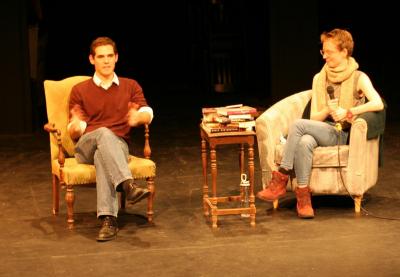 “Hey all from Portland, Oregon,” writes RADHA ROGERS. “I had the great pleasure of returning to Marlboro to visit last fall with several alumni friends. It was so great to see old friends and visit the school. My husband, Carlos, and I bought our first house. It’s been a few very exciting years. After 10 years as the middle school Spanish, cooking, health, and garden teacher at Portland Jewish Academy, I’m beginning a new job next month as the culinary arts teacher at the Durham Education Center, an alternative high school.”
“Hey all from Portland, Oregon,” writes RADHA ROGERS. “I had the great pleasure of returning to Marlboro to visit last fall with several alumni friends. It was so great to see old friends and visit the school. My husband, Carlos, and I bought our first house. It’s been a few very exciting years. After 10 years as the middle school Spanish, cooking, health, and garden teacher at Portland Jewish Academy, I’m beginning a new job next month as the culinary arts teacher at the Durham Education Center, an alternative high school.”
’98
In October, coffee entrepreneur DAGMAWI IYASU was on campus to make a presentation titled “Ethiopians: The Coffee People.” Dagmawi discussed the role of culture and technology in human resource and sustainable development, and of course coffee, followed by Q&A over a cup of awesome coffee. See the whole thing.
’99
HEIDI WAGNER writes, “This fall I began a new position as the program coordinator for the online construction engineering and management MS degree in the Department of Civil and Environmental Engineering at South Dakota School of Mines and Technology. SD Mines is a pure STEM school, making it an interesting comparison to a Marlboro educational experience.”
TAMARA RAUSA-DONATELLI visited campus in February with her family. She writes, “I am originally from Rio de Janeiro, Brazil, and I chose Marlboro because I thought it would be an experience unlike anything else in my life. I was right. Academically and personally, I carry those experiences with me every day. Recently, I had a serendipitous encounter with another Marlboro graduate. I am an ER physician in Pennsylvania, and I was transferring a patient to a hospital in Philadelphia in the middle of the night. The physician I was transferring the patient’s care was STEPHEN “VLAD” HUNT. We were friends for years at Marlboro, worked as RAs together, only to be reunited 10 years later, seemingly randomly, in the care of others. Pretty amazing. I definitely took a bite off the apple from the Marlboro apple tree and am forever enamored with the college, the campus, and the people.
Desmond Peeples ’13: Community in Rural America 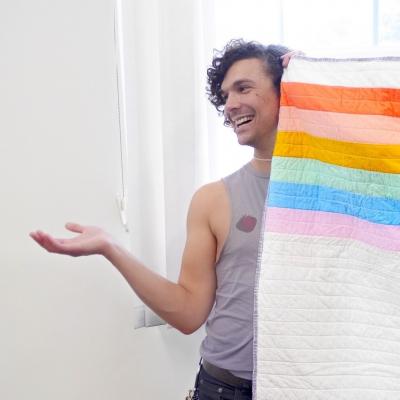
“Writing is everything to me,” says Desmond Peeples, who completed their MFA in writing at Vermont College of Fine Arts in January. “Good writing is good thinking. Good thinking becomes thoughtful action. Thoughtful action becomes a graceful life. That is what I love about writing—that when I stray from writing, I stray from the path, and when I return, it all returns with me.”
Desmond is the founder of Mount Island, the Brattleboro-based small press and literary magazine dedicated to creating space for the voices of rural LGBTQ+ and people of color to be heard on their own terms, and to finding solidarity in community. It is intended for anybody who wants to see rural America for what it really is, in all its diversity.
“It matters that we be together,” says Desmond. “That we’ve shared the same solitary path through the woods, the same pang of loneliness cut short by the gasp of beauty—crystal stream, bluebird, the green and gold canopy, life. That we can gather together as who we are, unbothered, and that we welcome others to raise their spirits in affinity—that matters.”
Although Desmond’s own work ranges from nonfiction to poetry, their current focus is in fabulist fiction. They are also the communications director for the Brattleboro Words Project, a community storytelling project backed by the National Endowment for the Humanities and local partners including Marlboro College. Desmond credits the rigorous research, clear writing, and dearness of community experienced at Marlboro with helping them in all of these endeavors.
Learn more at mountisland.com.
’02
In January, KATE HOLLANDER visited campus to read from her first collection of poems, My German Dictionary, winner of the Anthony Hecht Poetry Prize. She writes, “The book grows out of my experiences as a student, scholar, and teacher of Central European history and culture. It is a guide to an idiosyncratic interior country, a map of the experience of absorbing and being absorbed by German language, culture, aesthetics, and history, a catalogue of small beloved things inflected by massive horrors.”
’03 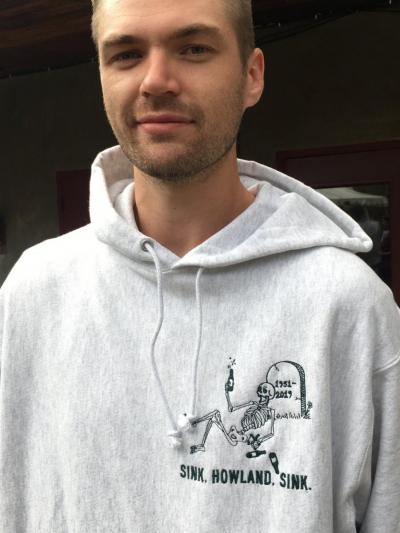 MATTHEW TEMPLE released his new movie, Hardball: The Girls of Summer, in September. The film follows five women of the US Women’s National Baseball Team as they battle for recognition and a gold medal in the Women’s Baseball World Cup. “It has been a true honor to be able to tell the story of these amazing women and their fight to play baseball,” says Matthew. The film had its theatrical premiere at the Women Sports Film Festival in San Francisco in September. Learn more at hardballfilm.com.
MATTHEW TEMPLE released his new movie, Hardball: The Girls of Summer, in September. The film follows five women of the US Women’s National Baseball Team as they battle for recognition and a gold medal in the Women’s Baseball World Cup. “It has been a true honor to be able to tell the story of these amazing women and their fight to play baseball,” says Matthew. The film had its theatrical premiere at the Women Sports Film Festival in San Francisco in September. Learn more at hardballfilm.com.
’04
In November, ELIZABETH THEIS presented a short film that she wrote and directed as part of the fifth annual Ax Wound Film Festival in Brattleboro, the official film festival of Women in Horror month. The film, Lizzie Boredom, is about a reclusive sociopath who has convinced herself she’s a television star following a traumatic childhood. The festival also included a filmmaker Q&A hosted by ANNIE ROSE MALAMET ’12.
’09
LILY SAGE is a permaculturalist, doula, and Montessori pedagogue/nature connection mentor who is interested in questions of symbiosis, intersectional feminism, and anti-racist/anti-fascist praxis. She has studied in the fields of herbalism, visual/performance art, anthropology, and political theory in Germany, Mongolia, and the US. She is most excited right now about presenting learning materials at the New Moon Mycology Summit, the prospect of filtering the Schuylkill River of petrochemicals using mycelial filtration, a mobile herbal free clinic, working on decolonizing school curriculums, and establishing abortion doula programs throughout her city.
’10
In December, ANDRÉ PEREZ was on campus as an outside examiner and presented the documentary series America in Transition, which he directed and produced. The series explores relationships, community, and social issues with trans people of color. Killer Movie Reviews says, “America in Transition depicts the harsh realities of living in a transphobic society, but it refuses to surrender to despair.” Learn more at americaintransition.org.
“The Green New Deal (GND) exemplifies how democratic socialists can envision future commitments to economic justice,” writes KENTON CARD in an August paper in Jacobin titled “Bernie Should Declare Housing a Human Right.” He said, “The GND does not make the important connection between the climate crisis and where and how we build our homes.” Learn more.
’11 ALICE PACKARD writes, “I have recently relocated to Los Angeles after three years working in the Chicago film community. I took advantage of the trip out west and did a 15-day road trip where I saw a handful of Marlboro alums along the way, including GREGORY MEYERS ’08, SAM LOWENTHAL ’09, SETH SEMPERE ’09, ALEXIA BOGGS ’13, SEAN PYLES ’13, and JOELLA SIMONS ADKINS ’12. It was really a great transition to my somewhat daunting adventure to see so many friendly faces on my way.”
’14
After working in admissions at Marlboro since 2015, KARA HAMILTON accepted a position at Youth Services in Brattleboro, where she serves as a case manager for homeless and at-risk youth as well as managing the agency’s Transitional Living Program. “I am grateful to have experienced Marlboro as both a student and a staff member. It was an honor to serve alongside so many dedicated staff members whose work often goes unobserved.”
In October, writer and editor LEZA CANTORAL was on campus for a reading and conversation with philosopher Lindsay Lerman and philosophy fellow Casey Ford titled “From Somewhere to Nowhere.” Leza is editor-in-chief of Clash Books, which recently published Lindsay Lerman’s debut novel, I’m From Nowhere, and also host of the Get Lit with Leza podcast where she “talks to cool ass writers.” She is author of Trash Panda, a collection of poetry, and Cartoons in the Suicide Forest, a collection of short fiction, and the editor of Tragedy Queens: Stories Inspired by Lana Del Rey and Sylvia Plath.
’19
HENRY ROBINSON had two ceramic sculptures from his senior Plan show selected by Sunshine Cobb for the Clay Festival 2019 International Juried Exhibition, titled Current. Both works sold on opening night into private collections. He also had another sculpture selected for the Annual Rhode Island Open Exhibition in his new hometown of Warwick, Rhode Island, and was chosen as a ceramics resident for a micro-residency program at the Steel Yard, Providence, Rhode Island.
CLAYTON CLEMETSON and MARCEA MACINNIS ’05 are collaborating to create a three-week singing and cycling camp in Ecuador in June 2020. Marcea was Clayton’s leader during the 2011 Ecuador Semester with Kroka Expeditions, a “transformative experience” for Clayton that influenced his decision to pursue holistic education at Marlboro. “This collaboration is a dream come true,” says Clayton. “It is incredible to be working alongside Marcea eight years after I was her student, and it was especially exciting to realize that we shared a Marlboro education.” Learn more.
Sarah Pidgeon MBA ’18: Making Green Energy Accessible 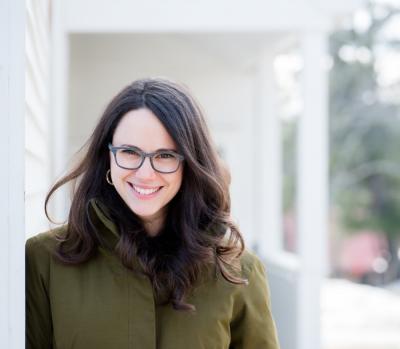
For her Capstone project, Sarah Pidgeon worked with a nonprofit environmental organization called Solar One to support education on climate change in the New York school system. Since graduating, she has been promoted to co-director of programs at Solar One, providing green workforce training for adults and K-12 education centered around renewable energy and climate change.
“Solar One is an incredible organization to work for,” says Sarah. “With the recent passing of the Climate Mobilization Act in New York City, it is crucial that we make sure that renewable energy is accessible, and that all New Yorkers have access to high-paying jobs in the clean energy sector.”
Solar One’s workforce program collaborates with organizations that support individuals who are unemployed, underemployed, or who have been impacted by the justice system, offering them hard-skills training in green construction and solar installation. The organization’s K-12 education program provides career-focused, hands-on programming for high school students and professional development training for teachers to incorporate climate change and renewable energy into their classroom curriculum.
“My experience at Marlboro has really supported me as I have grown in my role at Solar One,” says Sarah. “The tight-knit community and focus on collaboration and systems really made an impact on how I approach my work and my life. I feel incredibly grateful for my experience at Marlboro and for all of my friends and the phenomenal faculty.”
Learn more at solar1.org.
Former Faculty STAN CHARKEY, music faculty emeritus, premiered a new work at the Brattleboro Music Center in September, titled “J/J,” for cello and string orchestra, written for his son and resident artist Jacob Charkey. “I wanted to write a piece for Jake that connects to his experiences in both the Western and Indian traditions,” said Stan. “It’s called ‘J/J’ for Jake and Juno,” he said, referring to the Juno Orchestra, which accompanied Jacob in the premier.
CAROL HENDRICKSON, anthropology faculty emerita, published an entry in the International Encyclopedia of Anthropology (Beyond Texts volume), edited by Hilary Callan, and published by John Wiley & Sons. Learn more.
JIM TOBER, economics faculty emeritus, led an August walk around campus titled “Potash Hill—The Years before Marlboro College,” on behalf of the Marlboro Historical Society. A group of 25 or so participants joined the walk, and compared historic photos of the land and buildings with their current appearance. They also walked to the site of a former sugar house, and speculated on the location of the original potashery, where potash was produced.
In August, former president ELLEN MCCULLOCH-LOVELL was appointed interim executive director of Vermont Studio Center (VSC), the renowned international artists’ and writers’ residency program in Johnson, Vermont. In her role, part of an initiative to reshape VSC for the future, she will manage and assess operations while working with the board of trustees to identify and hire a permanent executive director.
In January, JIM TOBER and CAROL HENDRICKSON had a two-person art exhibit at the Crowell Gallery of the Moore Library in Newfane. Jim suggested calling it “What Social Scientists Do after They Retire,” but they settled on “Bricolage.” It included many of Jim’s collages and some of Carol’s journals and artist’s books, several of which grew out of her artist’s residency at Everglades National Park.
In September, former theater professor GEOFFRY BROWN launched a website to make his full series of 120 dramatic monologues, titled “Quintessential Americans,” available free of charge for download and use by history and drama students. Learn more.
Book Shelf
“I didn’t go outside often. Instead, I wrote, trying to contain the hunger for living, for real life, that literature stoked in me. I prowled the stairs to the top floor and back, hoping to ease this craving, to find inspiration without straying too far from my computer.” —Deni Béchard, My Favorite Crime
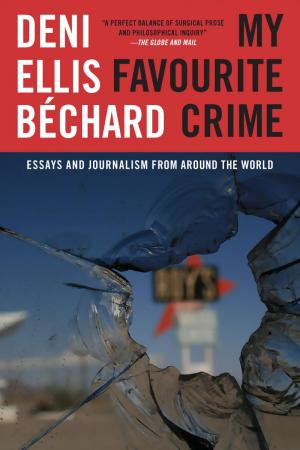 My Favorite Crime (Talonbooks, 2019), by Deni Béchard ’97, is a collection of essays that are at once personal and political. The first section describes Deni’s tumultuous relationship with his father (Potash Hill Winter 2013), while the second is long-form journalism, on topics ranging from children accused of sorcery and exorcised in Kinshasa to female vigilantes responding to rape culture in India. This is followed by a collection of dispatches from Afghanistan and a number of other countries. The final section includes essays on writing, especially the importance of political writing.
My Favorite Crime (Talonbooks, 2019), by Deni Béchard ’97, is a collection of essays that are at once personal and political. The first section describes Deni’s tumultuous relationship with his father (Potash Hill Winter 2013), while the second is long-form journalism, on topics ranging from children accused of sorcery and exorcised in Kinshasa to female vigilantes responding to rape culture in India. This is followed by a collection of dispatches from Afghanistan and a number of other countries. The final section includes essays on writing, especially the importance of political writing.
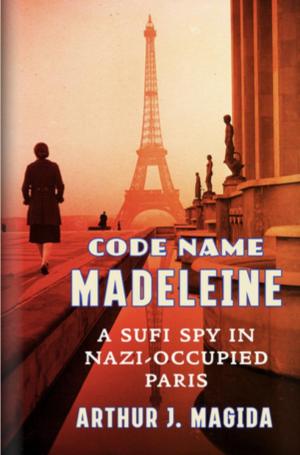 Code Name Madeleine: A Sufi Spy in Nazi-Occupied Paris (W.W. Norton, 2020), by Arthur Magida ’67, is the story of Noor Inayat Khan, a poet, musician, author, and undercover agent who invigorated the French Resistance. After outlasting most other radio operators, Noor tried to escape twice from a Nazi prison in Paris. Sent to Germany, she was shackled in solitary, then executed at Dachau. Code Name Madeleine brings to life this young mystic who wrote, “The heart must be broken in order for the real to come forth.”
Code Name Madeleine: A Sufi Spy in Nazi-Occupied Paris (W.W. Norton, 2020), by Arthur Magida ’67, is the story of Noor Inayat Khan, a poet, musician, author, and undercover agent who invigorated the French Resistance. After outlasting most other radio operators, Noor tried to escape twice from a Nazi prison in Paris. Sent to Germany, she was shackled in solitary, then executed at Dachau. Code Name Madeleine brings to life this young mystic who wrote, “The heart must be broken in order for the real to come forth.”
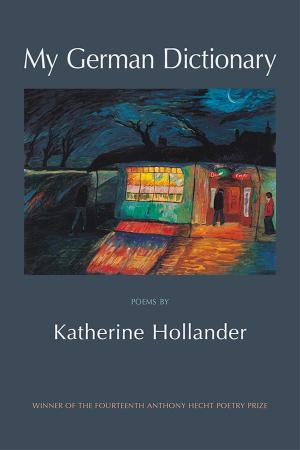 My German Dictionary (Waywiser Press, 2019) is the first book of poems from Kate Hollander ’02 and winner of the Anthony Hecht Poetry Prize. Complementing Kate’s work as a historian, these poems are home to and haunted by the Great War, Bertolt Brecht, Rosa Luxemburg, enchanted bears, Weimar Berlin, and vanished relatives, along with an entire alphabet of mishearings, mnemonics, and valentines for the German language. “A book of startling, radiant images that ferry the poems to their destinations of discovery and illumination,” writes former Poet Laureate Charles Wright.
My German Dictionary (Waywiser Press, 2019) is the first book of poems from Kate Hollander ’02 and winner of the Anthony Hecht Poetry Prize. Complementing Kate’s work as a historian, these poems are home to and haunted by the Great War, Bertolt Brecht, Rosa Luxemburg, enchanted bears, Weimar Berlin, and vanished relatives, along with an entire alphabet of mishearings, mnemonics, and valentines for the German language. “A book of startling, radiant images that ferry the poems to their destinations of discovery and illumination,” writes former Poet Laureate Charles Wright.
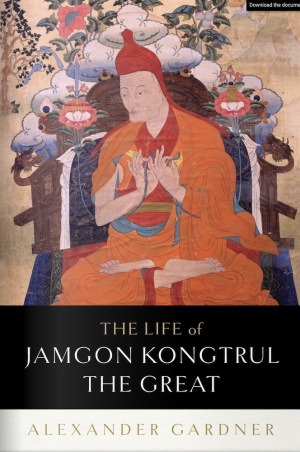 The Life of Jamgon Kongtrul the Great (Shambhala, 2019), by Alex Gardner ’92, is a historical biography of the 19th-century Tibetan teacher who forever changed the face of Buddhism. Known as the “king of renunciates,” Jamgon Kongtrul collected and disseminated the lineage traditions of Tibet at a time when the region experienced extreme sectarian and political divides, and his collections continue to be taught and transmitted throughout the Himalayas. Alex provides an accessible and intimate glimpse into the life of this important Tibetan Buddhist teacher.
The Life of Jamgon Kongtrul the Great (Shambhala, 2019), by Alex Gardner ’92, is a historical biography of the 19th-century Tibetan teacher who forever changed the face of Buddhism. Known as the “king of renunciates,” Jamgon Kongtrul collected and disseminated the lineage traditions of Tibet at a time when the region experienced extreme sectarian and political divides, and his collections continue to be taught and transmitted throughout the Himalayas. Alex provides an accessible and intimate glimpse into the life of this important Tibetan Buddhist teacher.
 Lines of Sight (Dorrance, 2018) is a debut poetry collection from James Pavlakis ’58. In poems ranging from witty to philosophical, personal to universal, rhymed and free verse to experimental, James observes or comments on the human condition with clarity and strength. Accessible, thought-provoking, Lines of Sight explores big topics while neither erecting barriers to comprehension nor dumbing it down. Kirkus Review says, “Alternating between traditional verse, heaped lines, and poetic structures…the author’s poems have a dynamism that’s similar to that of poet Ron Silliman’s The New Sentence.”
Lines of Sight (Dorrance, 2018) is a debut poetry collection from James Pavlakis ’58. In poems ranging from witty to philosophical, personal to universal, rhymed and free verse to experimental, James observes or comments on the human condition with clarity and strength. Accessible, thought-provoking, Lines of Sight explores big topics while neither erecting barriers to comprehension nor dumbing it down. Kirkus Review says, “Alternating between traditional verse, heaped lines, and poetic structures…the author’s poems have a dynamism that’s similar to that of poet Ron Silliman’s The New Sentence.”
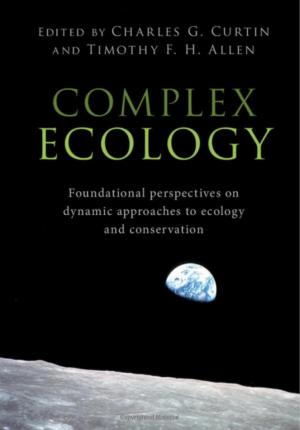 Complex Ecology (Cambridge University Press, 2018), edited by Charles Curtin ’86 (see page 8) and Timothy Allen, presents key research papers responding to new environmental challenges that defy quantifiable solutions. From climate change to species extinction, complexity-based ecology provides a new paradigm for ecologists and conservationists keen to embrace the uncertainty that is pressed upon us. The papers are set alongside first-person commentary from many of the seminal voices involved, and show how the shifting of wider perspectives allows new ideas to take hold.
Complex Ecology (Cambridge University Press, 2018), edited by Charles Curtin ’86 (see page 8) and Timothy Allen, presents key research papers responding to new environmental challenges that defy quantifiable solutions. From climate change to species extinction, complexity-based ecology provides a new paradigm for ecologists and conservationists keen to embrace the uncertainty that is pressed upon us. The papers are set alongside first-person commentary from many of the seminal voices involved, and show how the shifting of wider perspectives allows new ideas to take hold.
In Memoriam
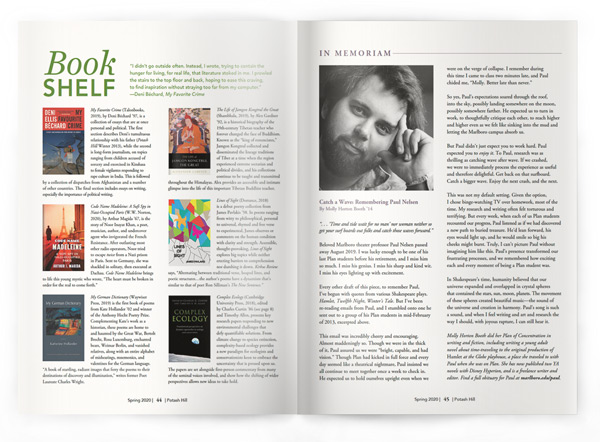
Catch a Wave: Remembering Paul Nelsen
By Molly Horton Booth ’14
“. . . ‘Time and tide wait for no man’ nor woman neither so get your surf boards out folks and catch those waves forward.”
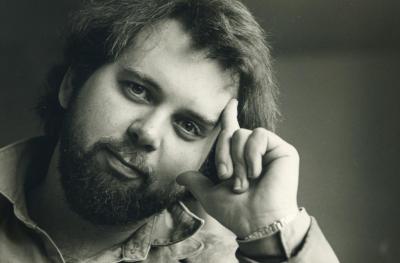 Beloved Marlboro theater professor Paul Nelsen passed away August 2019. I was lucky enough to be one of his last Plan students before his retirement, and I miss him so much. I miss his genius. I miss his sharp and kind wit. I miss his eyes lighting up with excitement.
Beloved Marlboro theater professor Paul Nelsen passed away August 2019. I was lucky enough to be one of his last Plan students before his retirement, and I miss him so much. I miss his genius. I miss his sharp and kind wit. I miss his eyes lighting up with excitement.
Every other draft of this piece, to remember Paul, I’ve begun with quotes from various Shakespeare plays. Hamlet, Twelfth Night, Winter’s Tale. But I’ve been re-reading emails from Paul, and I stumbled onto one he sent out to a group of his Plan students in mid-February of 2013, excerpted above.
This email was incredibly cheery and encouraging. Almost maddeningly so. Though we were in the thick of it, Paul assured us we were “bright, capable, and had vision.” Though Plan had kicked in full force and every day seemed like a theatrical nightmare, Paul insisted we all continue to meet together once a week to check in. He expected us to hold ourselves upright even when we were on the verge of collapse. I remember during this time I came to class two minutes late, and Paul chided me, “Molly. Better late than never.”
So yes, Paul’s expectations soared through the roof, into the sky, possibly landing somewhere on the moon, possibly somewhere farther. He expected us to turn in work, to thoughtfully critique each other, to reach higher and higher even as we felt like sinking into the mud and letting the Marlboro campus absorb us.
But Paul didn’t just expect you to work hard. Paul expected you to enjoy it. To Paul, research was as thrilling as catching wave after wave. If we crashed, we were to immediately process the experience as useful and therefore delightful. Get back on that surfboard. Catch a bigger wave. Enjoy the next crash, and the next.
This was not my default setting. Given the option, I chose binge-watching TV over homework, most of the time. My research and writing often felt torturous and terrifying. But every week, when each of us Plan students recounted our progress, Paul listened as if we had discovered a new path to buried treasure. He’d lean forward, his eyes would light up, and he would smile so big his cheeks might burst. Truly, I can’t picture Paul without imagining him like this. Paul’s presence transformed our frustrating processes, and we remembered how exciting each and every moment of being a Plan student was.
In Shakespeare’s time, humanity believed that our universe expanded and overlapped in crystal spheres that contained the stars, sun, moon, planets. The movement of these spheres created beautiful music—the sound of the universe and creation in harmony. Paul’s song is such a sound, and when I feel writing and art and research the way I should, with joyous rapture, I can still hear it.
Molly Horton Booth did her Plan of Concentration in writing and fiction, including writing a young adult novel about time-traveling to the original production of Hamlet at the Globe playhouse, a place she traveled to with Paul when she was on Plan. She has now published two YA novels with Disney Hyperion, and is a freelance writer and editor. Find a full obituary for Paul at marlboro.edu/paul.
William Horridge ’51
A Marlboro pioneer and longtime supporter of the college, Bill Horridge died in July 2019. Born in New Jersey, Bill attended local schools and graduated from the Peddie School in Heightstown, New Jersey. He attended University of Pennsylvania before joining the Army Counter-Intelligence Corps, and was deployed to the Philippines. He graduated from Marlboro College where he developed a love for Vermont, designed a beautiful class ring, and collaborated with other students to design the original woodcut Marlboro seal. Bill spent 27 years as chief of security at Picatinny Arsenal, then retired to become the resident broom maker and wood carver at Waterloo Village as well as stocking trout for the state of New Jersey. Later, Vermont beckoned, and he purchased, renovated, and restored the Eagle Tavern in East Poultney to be an innkeeper. He carved duck decoys and became a skilled cabinet maker. Bill’s great pleasures were sailing, skiing, camping, traveling, and sports cars. He is survived by his wife of 67 years, Gertrude, a son, and two grandsons.
Gretchen Hebb Bean ’57
A longtime resident of Scituate, Massachusetts, Gretchen Hebb Bean died in June 2019. Born and raised in Brattleboro, Vermont, Gretchen graduated from Brattleboro High School. Even though she found math and science classes challenging, she chose to study biology at Marlboro College. “Her love of science really took hold during her time at Marlboro, and I remember her telling me about a professor of hers who really pushed her to achieve and believe in herself,” says Gretchen’s daughter Lucy Bean Jenkins. She went on to earn her master’s degree in physiology at the University of Vermont, and finally her PhD in biochemistry at Boston University at the age of 46. She worked for many years in clinical and research labs, and later in life she founded Commonwealth Laboratories, where she worked until poor health forced her retirement at the age of 72. She volunteered as a Scituate Board of Health member for several years. She was the beloved wife of the late Richard A. Bean, with whom she shared 56 years of marriage. She is survived by her two children, her sisters Susan Hebb ’58 and Karen Hebb Piccolo ’68, who also attended Marlboro, nine grandchildren, and many nieces and nephews. Her family asked that donations be made to Marlboro College in her memory in lieu of flowers.
Karen Stein Hall ’66
We regret to report that we only recently learned that Karen Hall passed away in July 2008, at the age of 65. As of 2003, Karen reported in Class Notes having two beautiful granddaughters and surviving breast cancer. Karen grew up in Schenectady and attended Linton High School there before coming to Marlboro, where her Plan was in art history, focusing on the “protest painters” of American art in the mid-twentieth century. She married Terry Hall ’65, but they later divorced. Karen is fondly remembered by several people who grew up in Marlboro, having been a substitute teacher at the town elementary school. She went on to work in Schenectady as a casework supervisor at the New York State Office of Child and Family Services, which she described as working in “family court, police court, drug court, domestic violence court, the school system, horrible neighborhoods, elegant neighborhoods, and a truly awful system.”
Catharine Kurth ’86
A resident of West Hartford, Connecticut, Catherine Kurth died in August 2019 at the age of 56. Kate was born in Summit, New Jersey, and went to Hartford College for Women and Marlboro College, where she studied Irish history and literature. After college, Kate moved to San Francisco, California, and worked for Phoebus, a theatrical-lighting design company. She later returned to Connecticut to be closer to family, and for several years was a partner at Athena Trading Company, a home textiles design and manufacturing firm. Kate brought her artistic talent to many endeavors, and was a lover of literature, art, and design. She lived for travel, and had many adventures over the years both home and abroad, with some of her favorite memories from coastal Maine. Kate had the sharpest of minds, and she loved to match wits, challenge with trivia, and complete the New York Times Sunday crossword (in ink). She had a deeply generous spirit, and her family will always miss her keen intelligence, her wonderful laugh, and her loving heart. Kate is survived by her cousins and their families.
Daan Zwick, friend
Brother of former faculty member Huddee Herrick and a longtime supporter of Marlboro College, Daan Zwick of Rochester, New York, died in November 2019 at 97. Born in Burlington and a graduate of University of Vermont, Daan retired from a long career at Kodak, where he was a research scientist exploring image structure in color photography and the interface between motion picture film and color television. He and his wife, Janis Dowd, who predeceased him, were committed philanthropists and volunteers, active in Rochester Democratic politics and volunteering at the local American Civil Liberties Union chapter. An avid outdoorsman, Daan was a Green Mountain Club caretaker in the 1930s, an active volunteer into the 1980s, and a generous supporter of the club. His deep commitment to the Long Trail motivated him to financially support some of the club’s most significant projects, including the trail relocation through the Winooski River Valley and construction of the Winooski River suspension bridge. He is survived by four children, and six granddaughters and step-granddaughters, as well as his first wife, Laura Zwick.
Emily Mason, friend 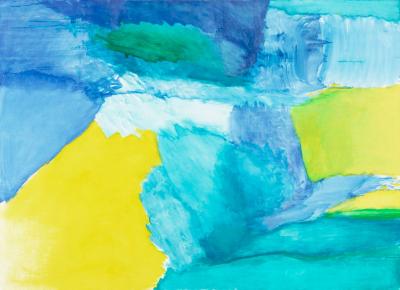 Renowned painter, honorary alumna, and longtime college supporter Emily Mason died in December at her hillside farm in Brattleboro, at the age of 87. Born in New York City, Emily graduated from New York’s High School of Music & Art and then studied at Bennington College before graduating from The Cooper Union for the Advancement of Science and Art. She was awarded a Fulbright grant to study painting in Venice, where she married artist Wolf Kahn, her husband of 62 years. She had her first solo exhibition at New York’s Area Gallery in 1960 and exhibited her work regularly thereafter, in New York and elsewhere. She also taught painting at Hunter College for more than 30 years. Her paintings are included in the collections of the Cleveland Museum of Art, National Academy Museum, and Bennington Museum, among others. In May 2019 Emily and Wolf received honorary degrees from Marlboro for their long and generous support. In addition to Wolf, Emily is survived by two daughters and their families.
Renowned painter, honorary alumna, and longtime college supporter Emily Mason died in December at her hillside farm in Brattleboro, at the age of 87. Born in New York City, Emily graduated from New York’s High School of Music & Art and then studied at Bennington College before graduating from The Cooper Union for the Advancement of Science and Art. She was awarded a Fulbright grant to study painting in Venice, where she married artist Wolf Kahn, her husband of 62 years. She had her first solo exhibition at New York’s Area Gallery in 1960 and exhibited her work regularly thereafter, in New York and elsewhere. She also taught painting at Hunter College for more than 30 years. Her paintings are included in the collections of the Cleveland Museum of Art, National Academy Museum, and Bennington Museum, among others. In May 2019 Emily and Wolf received honorary degrees from Marlboro for their long and generous support. In addition to Wolf, Emily is survived by two daughters and their families.
While this issue of Potash Hill was in production, we were saddened to learn of the death of Richard Liversage ’51 (see Potash Hill Spring 2017). We will plan on a full obituary in the next issue.
Magnanimity Cum Laude
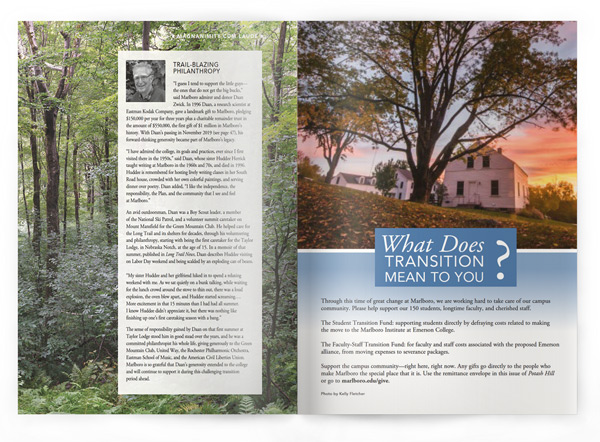
Trail-Blazing Philanthropy
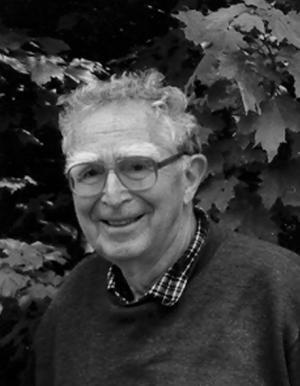 “I guess I tend to support the little guys— the ones that do not get the big bucks,” said Marlboro admirer and donor Daan Zwick. In 1996 Daan, a research scientist at Eastman Kodak Company, gave a landmark gift to Marlboro, pledging $150,000 per year for three years plus a charitable remainder trust in the amount of $550,000, the first gift of $1 million in Marlboro’s history. With Daan’s passing in November 2019, his forward-thinking generosity became part of Marlboro’s legacy.
“I guess I tend to support the little guys— the ones that do not get the big bucks,” said Marlboro admirer and donor Daan Zwick. In 1996 Daan, a research scientist at Eastman Kodak Company, gave a landmark gift to Marlboro, pledging $150,000 per year for three years plus a charitable remainder trust in the amount of $550,000, the first gift of $1 million in Marlboro’s history. With Daan’s passing in November 2019, his forward-thinking generosity became part of Marlboro’s legacy.
“I have admired the college, its goals and practices, ever since I first visited there in the 1950s,” said Daan, whose sister Huddee Herrick taught writing at Marlboro in the 1960s and 70s, and died in 1996. Huddee is remembered for hosting lively writing classes in her South Road house, crowded with her own colorful paintings, and serving dinner over poetry. Daan added, “I like the independence, the responsibility, the Plan, and the community that I see and feel at Marlboro.”
An avid outdoorsman, Daan was a Boy Scout leader, a member of the National Ski Patrol, and a volunteer summit caretaker on Mount Mansfield for the Green Mountain Club. He helped care for the Long Trail and its shelters for decades, through his volunteering and philanthropy, starting with being the first caretaker for the Taylor Lodge, in Nebraska Notch, at the age of 15. In a memoir of that summer, published in Long Trail News, Daan describes Huddee visiting on Labor Day weekend and being scalded by an exploding can of beans.
“My sister Huddee and her girlfriend hiked in to spend a relaxing weekend with me. As we sat quietly on a bunk talking, while waiting for the lunch crowd around the stove to thin out, there was a loud explosion, the oven blew apart, and Huddee started screaming…. More excitement in that 15 minutes than I had had all summer. I know Huddee didn’t appreciate it, but there was nothing like finishing up one’s first caretaking season with a bang.”
The sense of responsibility gained by Daan on that first summer at Taylor Lodge stood him in good stead over the years, and he was a committed philanthropist his whole life, giving generously to the Green Mountain Club, United Way, the Rochester Philharmonic Orchestra, Eastman School of Music, and the American Civil Liberties Union. Marlboro is so grateful that Daan’s generosity extended to the college and will continue to support it during this challenging transition period ahead.
Special Web Features
The Making of Northern Harmony
Staying in our true curiosity as learners: An interview with Kristin Horrigan
In October, Sativa Leonard ’23 sat down with dance professor Kristin Horrigan to talk about chemistry, contact improvisation, and heteronormativity.
Sativa: So how long have you been at Marlboro?
Kristin: This is my 14th year.
S: Nice, and how are you liking it here?
K: Oh my, I love it. This is my dream job. I feel so blessed to be here. I lucked out.
S: How did you come to be here?
K: I came here in stages. I first came here as an outside examiner in 2005. There was a student who was studying dance and technology, and they reached out to a professor of mine from graduate school. He wasn’t available, so he passed it down to one of his recent graduate students: me. That was my first time coming to Marlboro.
S: Who is that student?
K: Ian Smith-Heisters (’05), a great student—lovely person. And then later that same year, in the summer I got a call from Dana Holby, who was my predecessor here. She taught dance for, I think, 30 years at Marlboro, and she had decided very suddenly to retire in the middle of the summer. They needed someone for the next year, so they had a search for a part-time replacement person. I applied and got the job. And then while I was here they decided to have a search for full-time replacement for Dana, and I applied. I was very lucky to get to stay.
S: Well, we're glad to have you here.
K: Thank you.
S: So what do you think is the most rewarding part of your career here at Marlboro?
K: That’s a good question. Definitely the work with the students. The deep relationships you form and how intimately you get to support someone in their growth—that's very rewarding. There's also the part where the students stretch us as faculty in a million directions. They cause us to study things, think about things, talk about things, and do things that we never would have thought to otherwise. That keeps the job from ever getting boring, and is a gift that this job brings that most academic teaching jobs don’t bring in the same way, unless you have graduate students.
S: On the flip side, what would you say is the most challenging part?
K: Oh, workload. You know, in this community, we’re all here pretty much based on love, right? You get involved in the community, you care so much for your students, so you go the extra mile. Nobody tells you to not do more. You have to place your own limits.
S: Do you find that even with the smaller student population that it’s still a heavy workload?
K: Yes. Part of it is that my Plan student population is not that much smaller.
S: Oh interesting.
K: I’m graduating five Plan students this year, and five is as many as I’ve ever had in a year. It is different than it was though. I used to have 30 people in a Contact Improv class and now I'll have 12 or something like that.
S: Is it Plan students that really take up the extra time?
K:The Plan students, yes, and I think also I've stepped up in my committee work in a way. In my earlier years—when I was having 30 students in a class—I was new, so I wasn't getting elected to heavy workload committees like the curriculum committee.
S: So do you prefer having a smaller class group size?
K: There are benefits to both. There’s such a thing as too small and such a thing as too big. But no, I been very lucky. Dance classes serve a variety of needs in the student body—academic, personal, social, and health-related. There are a lot of reasons people take dance, so there tends to be enough people around. And I think the dance students also draw each other in, you know, because it is a social practice, even though it is an academic study. So there’s a peer group that forms, and people who aren't necessarily friends outside the classroom have an activity-based friendship that supports them to keep coming back.
S: And they want to be in each other’s choreography?
K: Yes, exactly. The social network is one of the main reasons I went on into dance instead of what I did my undergrad degree in, which was chemistry.
S: Really?
K: Yes. I have a B.A. in chemistry.
S: Wow.
K: Ultimately, a life of being in dance was more appealing to me, both because I exercise for work and because I relate to all sorts of passionate people. I worked a few years in a lab, and it just wasn’t what I felt called to do. I was conflicted about it though. That could be a longer conversation about how I struggled through my 20s, trying to figure out which direction to go!
S: What do you like most about teaching here?
K: So many things. One of the things I love about teaching here is that students are following their passions, interests, and curiosities, which means, most of the time when you have a student in class, they’re in your class because they want to be in your class. There are a few exceptions, where I ask a student who’s doing a Plan in my field to take a particular class to round out their understanding of the field. But most of the time everyone’s in that room because they want to be there, and that’s really beautiful. I taught as visiting faculty at a number of different colleges before I came here, and it is such a different vibe when you’re teaching a group of people who are there because they have to be. So that’s one thing, I suppose, that I love most about teaching at Marlboro. Also, we have incredible freedom to follow our students’ interests, and our own. That is a real gift that you don’t get most other places. Right now I’m meeting with my Plan students, and other students I know are interested in dancing, to figure out what I should teach next semester, and whether I should teach courses I’ve taught before or whether I should make up something new that better suits their interests (or that incorporates my evolving interests). That is so cool. Many other college faculty have their two or three courses they teach every year for their whole lives, and it’s a big process to initiate anything new or any change. Here at Marlboro the curriculum is so malleable, and it really allows us to stay in our true curiosity as learners.
S: could see some professors preferring to teach the same thing over and over again.
K: Absolutely. Yes.
S: There’s a freedom in that as well.
K: Yes, I know people who feel that way. For me, I have a passion for teaching, and feel that it, in some ways, has become part of my art. Mentoring student choreographers to find their voices, make their work as strong as possible, and develop their thinking processes to get below the surface in their own work is a creative practice.
K: May I ask you a question? I'm curious what is most speaking to you about your experience at Marlboro, thus far, although I know it has been brief.
S: Yeah, that’s a tricky question.
K: It is. And this transition is also one of the hardest ones, to start college. I’m sure there’s a lot that’s bumpy too.
S: Oh yeah. I'm really enjoying my creative writing class. Just kind of learning how to stretch myself as a writer, and try knew styles and voices.
K: Oh that's so great. Are you writing poetry or short stories?
S: Short narratives, yes. So some fiction, some non-fiction. I’ve come to realize non-fiction is not generally what I write. So it’s a little harder for me. But it’s interesting.
K: I appreciate your openness, especially what you said about enjoying being stretched to try different styles. That reflects an openness that is so helpful as a creator and that can be hard to have, too, because it can be vulnerable to try new styles or approaches that aren’t what you’ve gone towards before.
S: Yeah, it’s also helping me know what I don’t like to write.
K: Totally. Right. And there’s virtue in that too. Do you have any interest in dance, perhaps? No pressure.
S: I do like dance, but I'm also somewhat uncoordinated.
K: Well, that is not a prerequisite. I believe everyone should have the opportunity to dance. There are no demarcators of who is allowed to dance and who’s allowed to learn. We’re all learning.
S: I’ve definitely seen quite a range in student performances here.
K: Yeah, totally. I think that’s part of why I got hired here. I was running an intergenerational dance company at the time—people ranging from their teens up to their 80s—which is even more diverse than a Marlboro classroom in terms of abilities and experience. There's a lot of creative interest and potential in people bringing their lived experience to dance, even without a lot of prior dance training, and that makes sense to me in teaching. And it’s also a political stance, I think. I don't believe that someone’s family should have been able to afford dance lessons in order for them to be able to dance in college. And I don’t want to make it that kind of issue because I know there are people who would love to dance, but who, for reasons of geographic location or family income or whatever, couldn’t.
K: I think we first met in the dance studio?
S: Yes. I was there for a play rehearsal. John (Marinelli ’20)’s Hamlet production.
K: Nice, that’s so great. Who are you?
S: Horatio.
K: An important character.
S: Yes.
K: You die, though, right?
S: No, I’m like the one character who doesn't die.
K: I haven’t read Hamlet in too long.
S: I do get the last line. After Hamlet dies. It's very dramatic, emotional. So I have to work on that.
K: Yes, because everybody’s dead except you! I bet John is great as a director, though.
S: Oh yeah. We'll be using actual swords since he knows fencing. And Reily (Mumpton ’15), the fencing instructor, is going to be in it.
K: Wow. Okay, so maybe I shouldn’t sit in the front row!
S: Probably not.
S: So, are there any projects you're working on right now that you’re excited about?
K: Let’s see. There are several, all in a very nascent stage. I’ve been working on a solo for myself, though I usually make dances for other people. I’m mostly more interested in creating dances for other people, especially people who have relationships. For example, I like to work with families or communities. And I have been less interested in artmaking as baring my own soul in recent years. But, I have been re-considering what it is to make solo work on myself. And I’m excited about that. That said, I don’t have a performance date or anything fixed like that yet.
S: You think it’s something we might be able to see at some point?
K: At some point, but I haven't made anything in probably 15 years without the concert date breathing down my back. And so right now I’m just making without having a set time I have to show it, and it’s a totally different process. We’ll see. I hope I make something I show, but I can’t guarantee it.
S: Well we would definitely be interested in seeing it, one day.
K: Thank you. There are other projects as well. I just launched a new website. That was my summer research project. I haven’t had a website for my professional dance work since I closed my dance company, Dance Generators, five years ago. It was time to launch my own site, reflecting the different branches of my work.
S: Is Dance Generators not a thing anymore, or you’re just not involved in it?
K: There’s still a branch of Dance Generators on the west coast, but the Dance Generators I was directing out here is closed. It’s something I would love to do again someday, but it's just not sustainable with a full-time job here. The company is pretty full-time on its own, and it’s entirely unremunerated.
S: So what’s on your website?
K: My website tries to reflect the different branches of my work. It has a section on the research I’ve been doing with gender and contact improvisation which I wrote about in Potash Hilla couple years ago. That research is ongoing. I started a blog, which I was pressured into by a friend, but it’s turning out to be a nice outlet. I do write some things for publication, but publication by peer reviewed journals takes so long. It can take two years between when you write the article and when they publish it. By the time they publish it, it’s old hat. It’s not my interest anymore. The website has also stuff about my choreographic practice—about my intergenerational work both with the company and with family dances. For example, it has the family dance I created last spring with Adam (Franklin-Lyons, history professor) and his family.
S: That sounds precious.
K: I’ve also done a lot of community-based projects that are about bringing a community of usually untrained dancers together to think about a community issue of importance to them, through movement and theater activities. The process results in a performance that shares back to that community and generates dialogue around the issue at hand. There’s also journal article I want to be writing but haven’t been. It’s about some changes I’ve made in my curriculum to de-center whiteness and welcome students with a broader range of backgrounds. Also, an outcropping of my gender research has to do with holding queer spaces in the dance community, as well as, some other work about diversity, inclusion, equity ,and access in dance communities. So some of it has to do with diversity broadly and some of it specifically with gender and sexuality. Earlier this week I got asked to hold a three-day-long dance event, a combined workshop and collaborative space, specifically aimed at people who identify as queer—who self-identify as queer: we're not checking their queer cards at the door!
S: Sounds like a really good conversation to have.
K: There definitely is a need, particularly in the contact improvisation world, to have spaces that are safer for queer individuals. There’s also a need to build awareness so the dance spaces are not dominated by unconscious heteronormative patterns of interaction, which are often really predominant in contact improvisation world.
S: Great. We could use a little less heteronormativity everywhere.
K: Amen. Yeah, it’s so complicated. One of my gender studies Plan students and I talk about this all the time. Gender and queerness, both in and out of academia, are changing so fast right now.
S: Yes.
K: There’s a huge difference between my generation and your generation. There are so many different options and words and understandings and histories and experiences. How to hold a space that includes not only your generation and my generation, but the people older than both of us?
S: So you studied gender and dance. How did you come to study that combination?
K: My gender studies knowledge is mostly self-taught. Lots of reading. I was a dance minor in college and then I got an MFA in dance.
S: So you had a dance background?
K: Yes, I've been dancing since I was 4. And in grad school I got really interested in dance and politics—social and political issues. I think it was because dancing and making dances all day, and it felt like intense navel-gazing. I was in this program with 35 grad students, all focused on dancing all the time, and it just felt so self-absorbed. I didn’t want to just be dancing to look pretty, or dancing because I like to jump around. I wanted there to be some way in which I could connect to the outside world and make some kind of difference. I studied many different artists—how are people doing this? And that’s how I ended up in intergenerational work, because I ended up concluding that the people you work with are the people most deeply affected, not the people who see you dance for an hour in a show.
S: I’m sure you had an impact on your audience, too. I mean they see they see the connection.
K: That was how the work made an impact. Our real relationships were visible on stage, and that was powerful. We also did 10 shows a year in elementary schools, nursing homes, and all around the community. And so we were quite known because we showed up all over the place. The idea that senior citizens can dance with younger people and we’re all artists together was pretty well accepted in that community because of that. I didn’t start this company—I can’t take credit for this notion. My mentor, Amie Dowling, started the company and I danced in it. Then when she moved away, I took it over.
But anyway, you asked about gender and I didn’t talk about that at all. Gender is something I've been interested and curious about since college, when I had my own struggles with my gender. I was pissed about sexism, I was pissed about heteronormativity. I was upset about a lot of things I didn't have words for, and there was no gender studies back then where I was at school. I had no language to put to this. So I’ve been sort of piecing it together over years. And then, at some point I started to gather together stuff I’d been reading and looking at in the dance field and decided, well, I’m going to teach a course on gender studies as it’s applied to dance. And since then my knowledge has grown, and I’ve read a lot. Then about five years ago, on my sabbatical, I got in an argument with some colleagues at a teachers’ exchange in Germany. That was really the turning point, where gender became the focus of my research. Because it was a contact improvisation conference, and we were all experienced teachers, and the men—cis-gender, male-identified people—in the room completely took over this conversation and began shouting. Eventually all the women—this was a very cis-gender, binary kind of crowd at that particular event—sank to the floor.
S: Literally?
K: Yes, literally. At a certain point I stood up and started yelling "stop!" I said, “look at what we are doing. This is an un-gendered dance form based on equality and mutual respect. Look at the dynamic in this room. Is this how we want to comport ourselves as an international body of experienced teachers in this form?” And everybody, to their credit, was like, “This isn’t what we want to do,” and it led to a lot of interesting conversations. That was the moment where I realized that my field really needs to think more about issues of gender and power, habits and heteronormativity, and all this stuff. So, in the five years since then, that’s been the main thrust of my research.
S: Have you had students along the way that have kind of had that interest as well?
K: I've had a few, not necessarily in gender and contact improvisation though, I don't think. Rosie (Kahan ’15) did a Plan on gender and ballet. And Mercy (Solbeck ’19) is doing a gender studies Plan that has nothing to do with dance. Erika (Klemperer ’15) did her Plan in physical humor, but she played a lot off of binary gender roles and heteronormativity—poking fun at them. She also did some really interesting work early on about dance and gender—a piece that John (Marinelli ’20) starred in. It was a dance for a person who was transitioning. And it was so detailed and so articulate in all these little subtle ways of embodying this teenager in transition.
S: That’s amazing.
K: That was a really sweet and powerful work, especially because it was really before we had a particularly articulate conversation about trans identities on this campus.